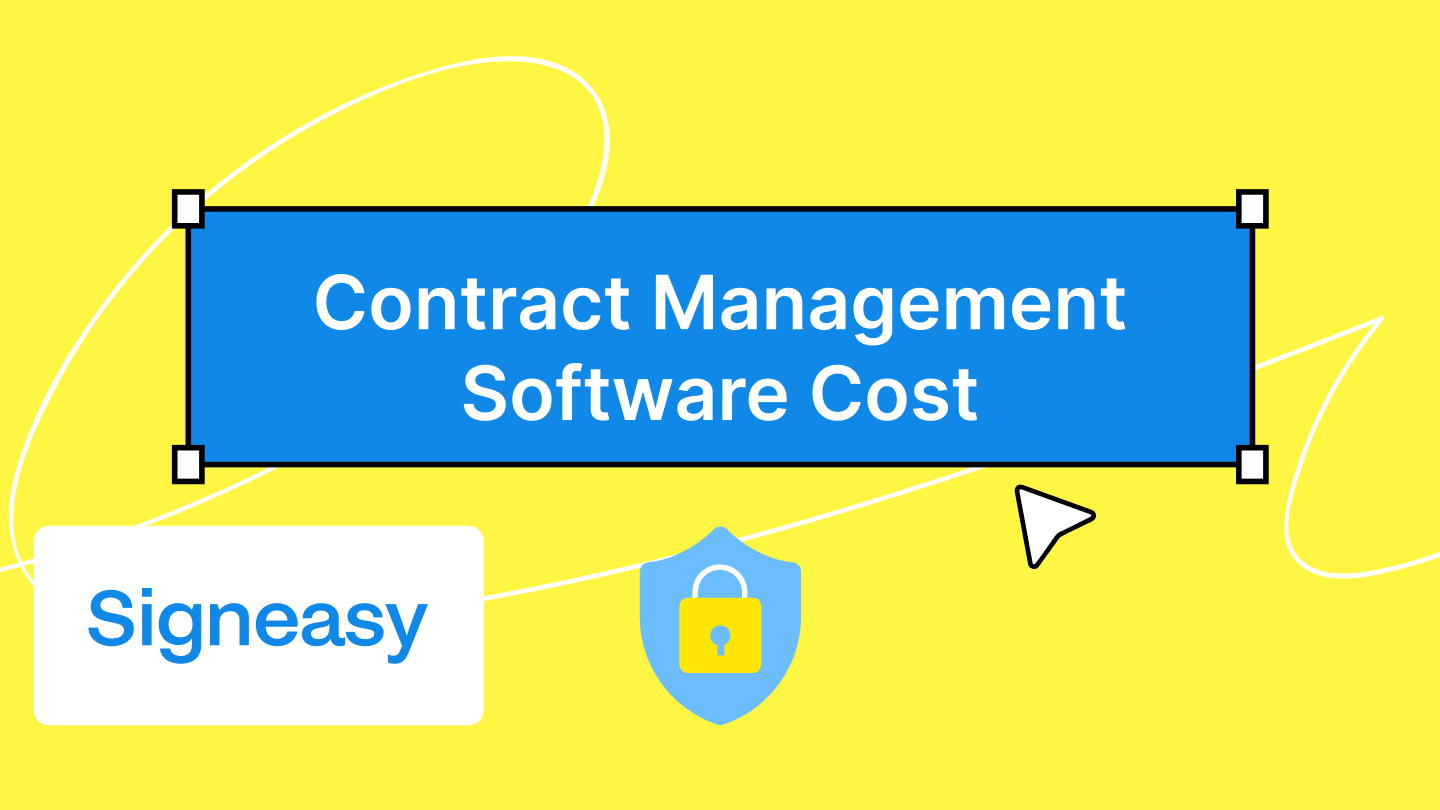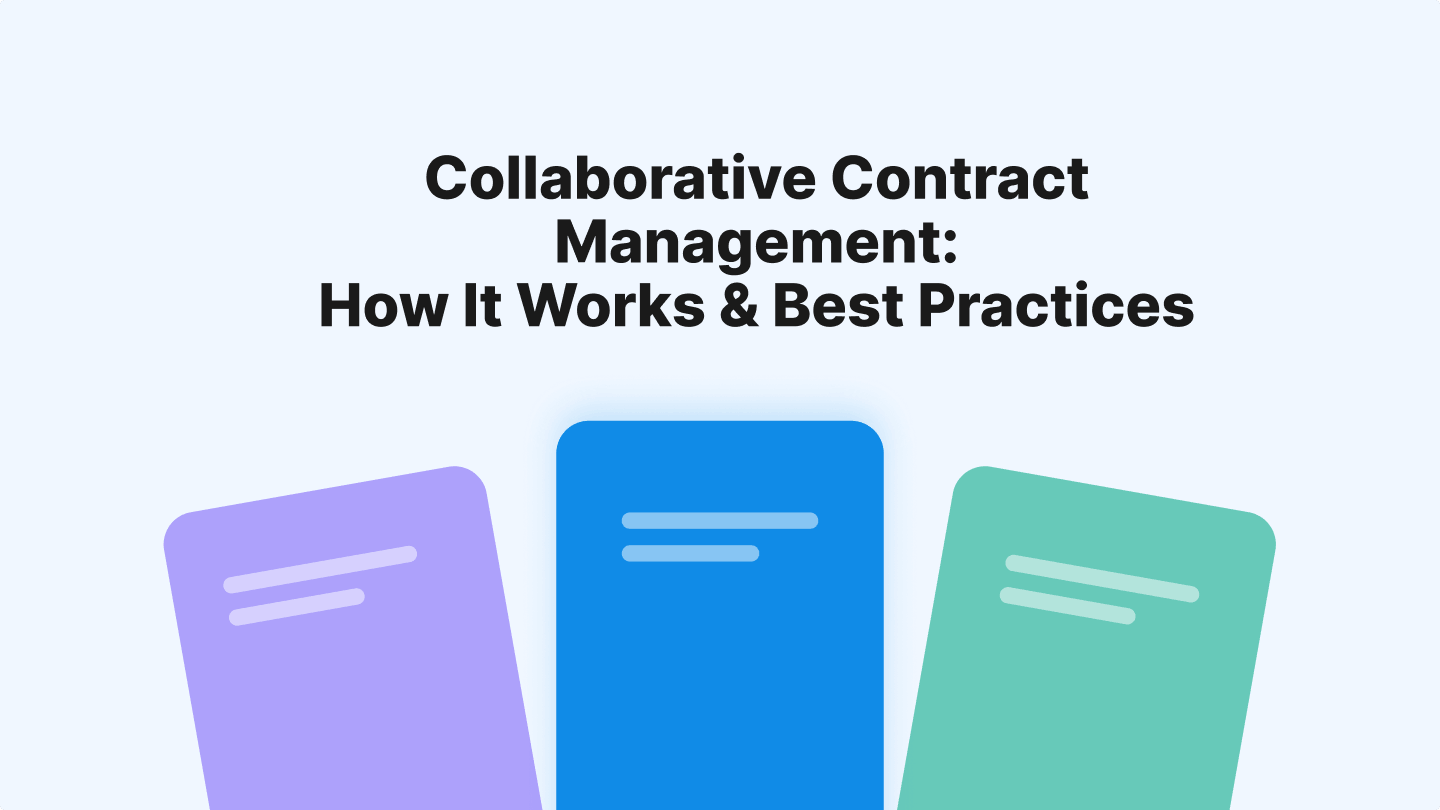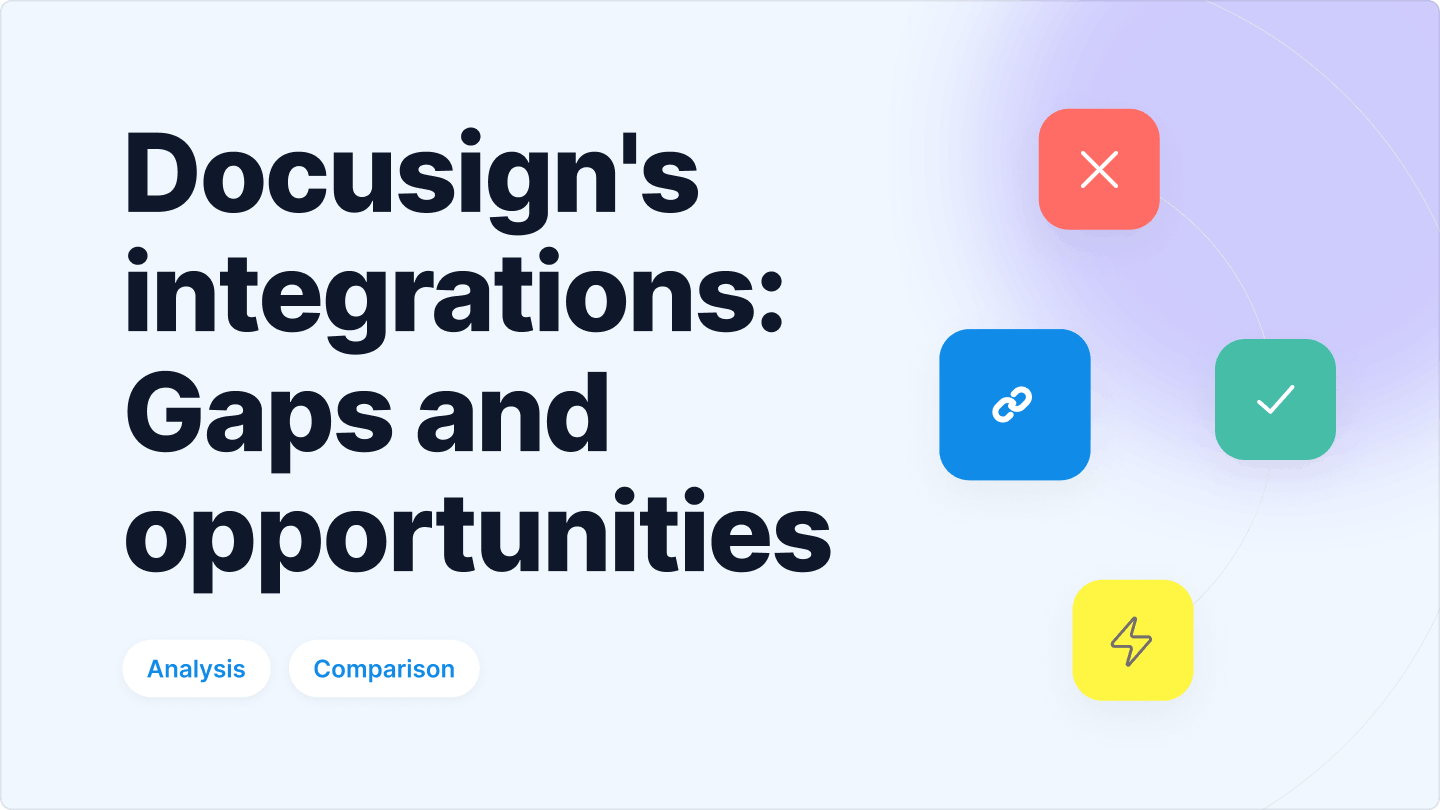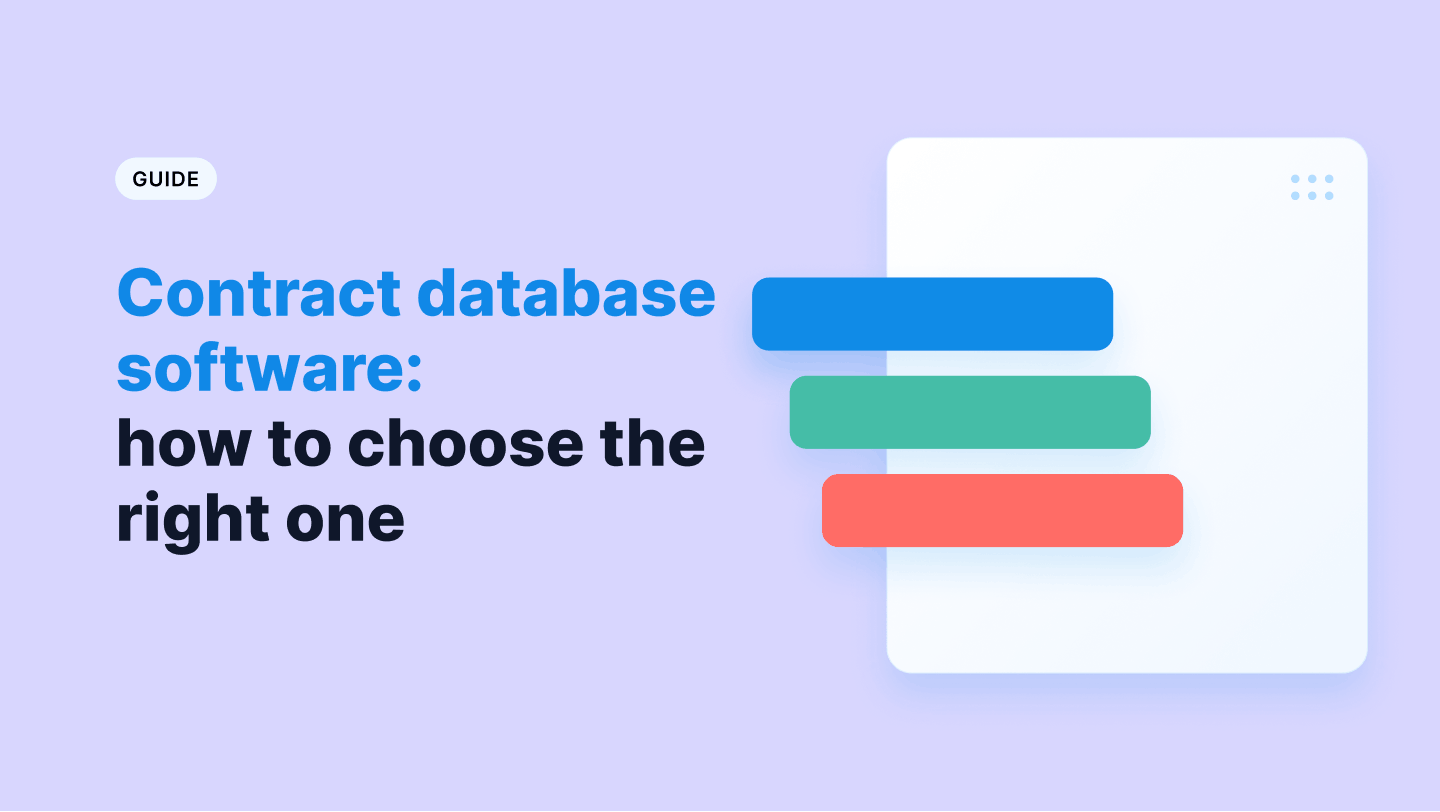81% of companies plan to adopt contract automation, according to World Commerce and Contracting. And it is easy to see why: manual contract management eats up time, invites errors, and leaves compliance teams on edge.
Contract management software solves these problems by centralizing documents, automating workflows, and ensuring every change is tracked. But for most decision-makers, the real question is not “Should we use it?”, it is “How much will it cost?”
The answer isn’t as simple as checking a price tag. Pricing can vary widely depending on the features you need, the size of your team, and whether you want advanced capabilities like managing roles and permissions, blocking unauthorized access, or deep CRM integrations. Some vendors bill per user; others offer flat-rate plans.For teams currently using Adobe Sign, reviewing Adobe Sign alternatives can uncover more budget-friendly solutions.
In this blog, you will learn:
- What contract management software is and the benefits it delivers
- Must-have features to look for in 2026 (so you do not overpay for the wrong tool)
- How different pricing models work
- A side-by-side comparison of top contract management software, including features, pricing, and reviews
By the end, you will have a detailed framework for assessing value, recognizing unnecessary costs, and selecting a platform, including how Signeasy measures up against other solutions.
What is contract management software?
Contract management software is a cloud-based platform that enables businesses to create, store, track, and manage contracts from drafting to renewal. It keeps every agreement in a centralized repository, automates recurring tasks such as routing approvals, sending renewal reminders, and generating compliance reports, and maintains an auditable history of every change.
By streamlining these processes, the software reduces administrative workload, minimizes errors that can lead to missed obligations or penalties, and shortens negotiation cycles.
Benefits of contract management
Contract management software streamlines critical tasks such as drafting agreements, routing them for approval, tracking key obligations, and managing renewals. By improving visibility and automating repetitive work, it delivers measurable cost savings and operational efficiencies across the contract lifecycle.
Here’s how it strengthens financial and operational performance:
- Avoid costly compliance penalties — Automated alerts tied to contract milestones and regulatory requirements like GDPR and HIPAA help organizations meet obligations on time, while also supporting audit readiness for frameworks such as SOC 2.
- Cut manual administration costs — Workflow automation and standardized templates shorten drafting, review, and tracking time by as much as 50% (WorldCC), freeing resources for higher-value work.
- Prevent revenue leakage — A centralized repository with advanced search flags upcoming renewals, lapsed SLAs, or unfavorable clauses before they erode margins.
- Accelerate deal cycles — Digital approval workflows route contracts to the right stakeholders instantly, allowing faster sign-off, earlier revenue recognition, and lower holding costs.
- Optimize vendor spend — Analytics on contract terms and usage patterns support more favorable rate negotiations and help phase out underutilized vendor agreements.
Must-have features in contract management software (2026 edition)
The cost of contract management software often reflects the depth and quality of its features. Higher-tier plans deliver far more than basic storage, incorporating capabilities that improve operational speed, ensure regulatory adherence, and enhance collaboration across departments.
These are the core capabilities to assess when weighing price against value:
1. eSignature

Integrated eSignature tools remove the need for a separate signing solution, consolidating costs and keeping teams in one workflow. Leading platforms allow signatures via drawing, typing, or uploading, along with brand elements like ink color and font. For instance, a recruitment agency can finalize offer letters directly in the platform, reducing time-to-hire and minimizing administrative delays.
2. Contract templates
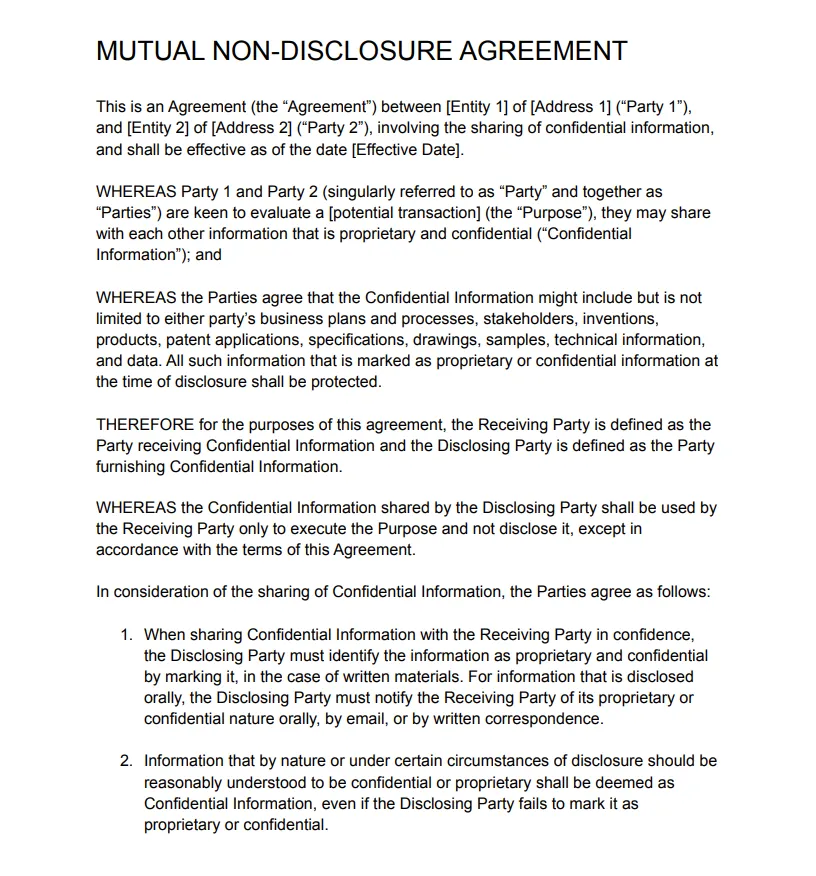
Pre-approved templates for agreements such as NDAs, master service agreements, or employment contracts help standardize language, shorten drafting cycles, and reduce legal review hours. A retail chain can quickly adapt a vendor agreement template for multiple suppliers while maintaining consistent terms and compliance across locations.
3. Security features
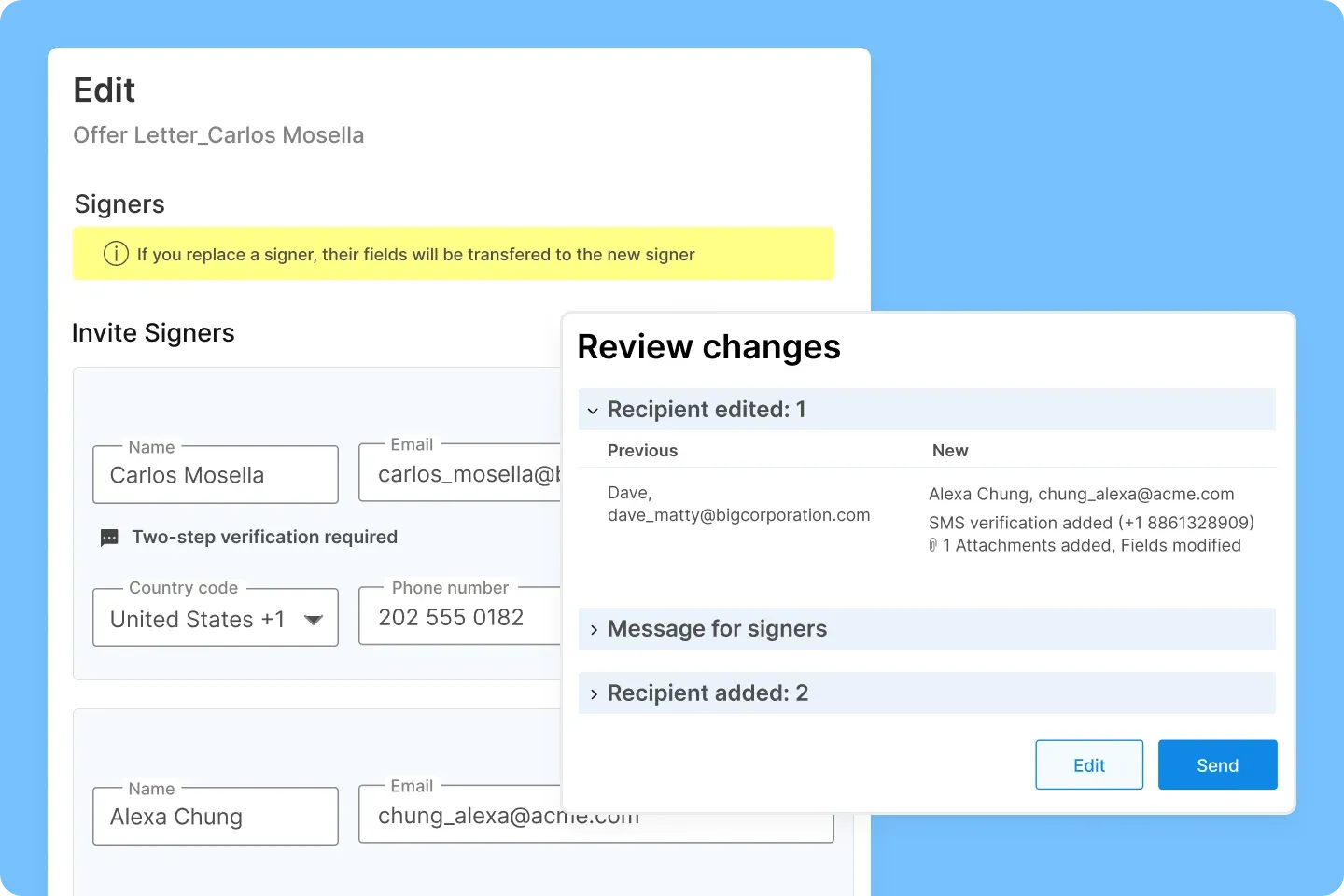
Security is one of the most critical considerations when evaluating contract management software. Contracts often contain sensitive financial, legal, and business information, making them prime targets for unauthorized access or misuse. A modern CLM platform must go beyond basic password protection and provide enterprise-grade safeguards that ensure data privacy, regulatory compliance, and trust across teams.
Below are the key security features every organization should look for in 2026.
Essential security features to look for in contract management software (2026)
These features safeguard sensitive contract data while strengthening compliance and trust, giving enterprises a secure foundation for scalable growth.
4. Collaboration tools
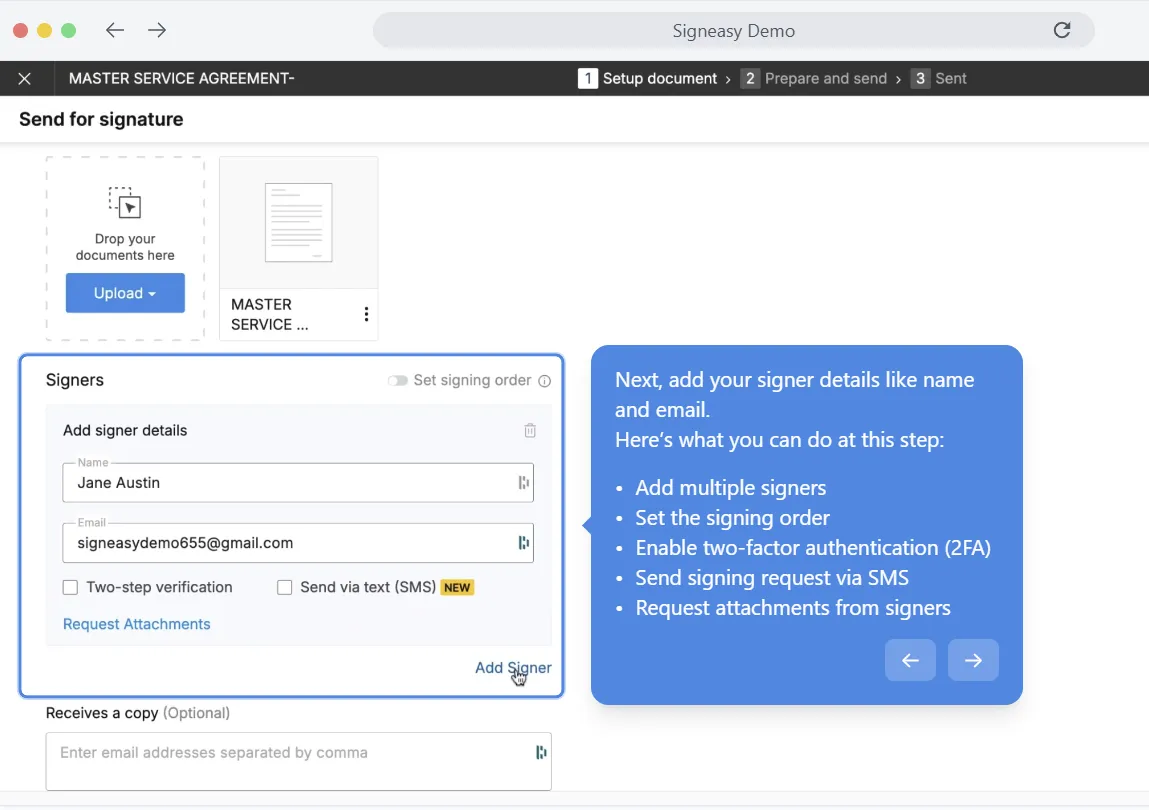
Real-time collaboration features — multi-signer routing, sequential or parallel approvals, shared templates, and in-document comments — reduce back-and-forth emails and shorten decision-making timelines. A cross-border legal team, for example, can review and edit contracts simultaneously, avoiding version conflicts.
5. Integrations
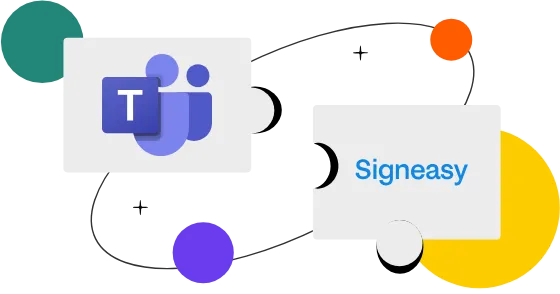
Seamless links to CRMs, ERP systems, and cloud storage platforms (e.g., Google Drive, HubSpot, Google Workspace) keep data synchronized across business applications. Enhanced integrations, like automated field population from a CRM, eliminate manual data entry.
A healthcare provider might integrate its contract system with patient management software to align vendor agreements with service delivery schedules.
6. Contract automation
Automated approval routing (and sequential signing), task reminders, and AI-driven renewal alerts help accelerate contract progression and reduce administrative burden. Real-world customers — for instance, Albea Cosmetics, cut approval times by 50%, with 73% of documents processed within 24 hours, freeing teams to focus on strategic work.
7. Custom branding
Personalized portals, document templates, and dashboards with a company’s logo maintain a consistent visual identity. Professional services firms often use these branded interfaces to reinforce client trust during onboarding and contract sign-off.
8. Mobile access

Modern contract management software offers feature-rich mobile applications that enable contract review, signing, and basic edits from any location. Cross-device session continuity means a contract drafted on a desktop can be finalized on a phone or tablet, ensuring flexibility for today’s distributed teams.
Many solutions also provide multilingual interfaces, helping multinational organizations collaborate more effectively. For instance, a logistics manager could approve a carrier agreement mid-transit to prevent shipment delays.
Platforms like Signeasy extend this capability with native mobile apps for iOS, iPad, and Android, enabling cross-device workflows and multilingual accessibility, especially valuable for field operations in industries such as healthcare and education.
9. Analytics and dashboards
Advanced reporting surfaces data on contract cycle lengths, approval bottlenecks, and supplier performance. These insights help decision-makers identify inefficiencies and negotiate better terms. A procurement lead might use analytics to highlight underperforming vendors and redirect spend toward more reliable partners.
When comparing platforms, evaluate how each capability influences efficiency, compliance, and financial outcomes. The right mix of features can justify a higher subscription cost by delivering measurable returns in both time and budget.
Key factors affecting contract management software price
Before you compare tools, it is helpful to understand what drives the cost of contract management software. Here are the main factors that influence contract management software price:
Knowing the cost drivers is only half the picture. The other half is understanding the pricing structures providers apply to translate those drivers into subscription tiers or contracts.
Common CLM pricing models
Contract lifecycle management (CLM) platforms typically follow one of several pricing approaches, each tied to different usage metrics. Understanding how these models work — and their impact on budgeting — helps in comparing vendors and predicting long-term costs.
The table below compares these pricing models side by side, outlining how each works, its pros and cons, and the types of businesses that benefit most.
While the table offers a side-by-side view, understanding how each model works in practice is key to choosing the right option. Let’s look at them more closely.
- User-based pricing
Vendors charge per active seat and volume discounts after defined breakpoints. Minimum seat counts and add-ons such as SSO, advanced permissions, or extra workspaces commonly sit outside the base price.
According to Metronome’s State of Usage-Based Pricing report, 85% of CLM vendors favor this model because it mirrors how organizations roll out access across legal, procurement, and sales teams. Ideal for broad rollouts across legal, sales, and procurement with predictable headcount; monitor seat activation to avoid shelfware.
- Usage-based pricing
Costs scale with activity — envelopes executed, workflows run, documents generated, or API calls. Contracts typically specify monthly pools, overage rates, and rate-limit thresholds. Teams with seasonal demand or integration-heavy deployments benefit most. Keep real-time dashboards and alerts for spikes, and negotiate burst capacity for quarter-end surges.
- Custom pricing
Vendors design customized plans around an organization’s contract types, regulatory obligations, and workflow complexity. For example, a healthcare provider may need HIPAA compliance modules and advanced audit reporting, while a financial services firm might require trust seals or specialized encryption for sensitive agreements.
Pricing reflects the specific mix of features and integrations rather than a flat seat or volume metric. Because requirements vary widely, sales teams typically evaluate a company’s use cases and propose a tailored package that aligns capabilities with business priorities.
- Hybrid approaches
Common structures combine a platform subscription with seats plus metered usage or contract pools. Multi-year agreements may include drawdown credits, commit-to-consume discounts, and step-ups tied to adoption milestones. Before signing, model total cost over 12–36 months across low/medium/high scenarios and include ancillary items — premium support, audit-log retention, sandbox environments, and additional integrations — to avoid surprises later.
Ultimately, the right pricing model depends on how your organization manages contracts today and how you expect that to evolve. By aligning software costs with measurable business value, you can ensure your CLM investment delivers both efficiency and long-term ROI.
Top 10 contract management software: How much do they cost?
Signeasy, Ironclad, and Docusign CLM are among the most widely adopted solutions, offering flexible pricing models and strong mobile availability to suit different business scales. While Signeasy starts affordably at $10/month, Ironclad caters to enterprises with custom pricing, and Docusign CLM blends accessibility with robust feature depth. If your team is also evaluating Adobe's ecosystem, our Adobe Sign pricing guide offers a detailed cost breakdown to help you compare.
Beyond these, several other platforms like Avokaado, Revnue, HyperStart, PandaDoc, ContractWorks, and Concord bring unique strengths tailored to specific teams and contract volumes.
How we sourced our data
To help you make an informed decision, we gathered data from reliable and publicly available sources:
- Contract management software pricing and feature information were compiled directly from each vendor’s official website to ensure accuracy.
- User reviews and satisfaction ratings were sourced from trusted platforms like G2, Capterra, and Trustpilot to reflect real-world experiences.
This combination ensures the list reflects both real-world performance and verified vendor details, giving you a practical view of which tool may fit your business best.
1. Signeasy contract management software

Signeasy is an AI-powered contract management platform that combines robust features with affordable plans, making it a strong value pick for cost-conscious teams. It includes unlimited eSignatures, real-time collaboration, in-flight edits, audit trails, and AI-powered summaries, plus integrations with popular tools and mobile access.

Workflow automation, custom branding, and compliance-ready audit logs help reduce manual work and shorten contract cycles. Advanced options like role-based permissions and signer document requests are available without enterprise-level pricing.
By offering scalability, security, and measurable efficiency gains at a competitive cost, Signeasy delivers strong ROI for businesses seeking high performance on a reasonable budget.
Global brands like Albéa Cosmetics have seen measurable results with Signeasy. 73% of multi-document envelopes were finalized within 24 hours. 32% of contracts were signed in under an hour. The company saved 1,800+ hours on paperwork every year.
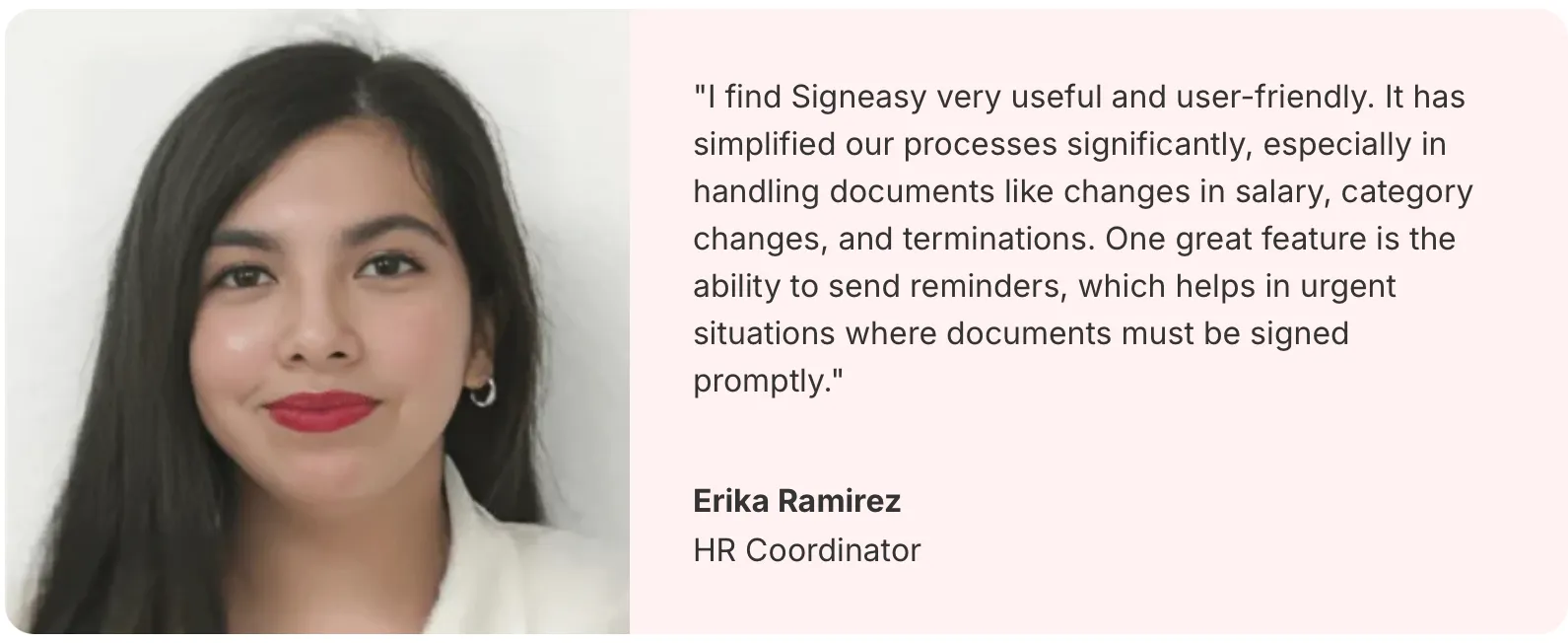
Albéa Cosmetics’ HR coordinator Erikia Ramirez appreciates Signeasy for being user-friendly and mentions how it has simplified their processes significantly
Signeasy streamlined document creation and approvals in HR, Finance, Quality, and Logistics. It helped Albéa cut costs, speed up processes, and maintain compliance. With mobile apps and integrations, Signeasy delivers speed, security, and simplicity at scale.
Signeasy’s price (user-based):
Signeasy’s pricing is designed to be flexible and budget-friendly for businesses of all sizes, without the rigid annual-only commitments seen with other tools:

- Personal: $10/month, $120 billed yearly. Ideal for individuals or small teams managing occasional signature requests. Includes core eSignature features to get started quickly
- Business: $20/month/user, $240 billed yearly. Built for growing teams that need regular collaboration and advanced admin controls, without overpaying for features they won’t use
- Business pro: $30/month/user, $360 billed yearly.Tailored for high-volume contract workflows with automation, integrations, and priority support, offering enterprise-grade efficiency at a more accessible price point
- Build your plan: For organizations with specific requirements, Signeasy offers a tailored pricing plan based on your usage and feature needs
- Free Trial: 14 days with full access to all Business Pro features
Unlike providers that require the full annual fee upfront, Signeasy offers the choice between monthly and annual billing, giving businesses more flexibility and control over cash flow. This makes it easier for startups and scaling companies to invest in a professional eSignature solution without a steep upfront cost while still getting the reliability and feature depth of a top-tier platform.
Signeasy’s key features:
- Flexible post-send edits: Make changes even after sending a document. Add or remove signers and CC recipients while keeping a complete audit trail for transparency
- AI-powered contract insights: Get Smart Q&A, AI-generated summaries, key term extraction, and automated renewal reminders synced to your calendar to save time and reduce errors

- Attachments in workflow: Add supporting files directly into contracts, removing the need for back-and-forth emails
- Custom email preferences and read receipts: Choose which notifications you receive and track when recipients open documents, so you can follow up at the right time
- Signature ID and trust seal: Every signature includes a unique ID and verified seal to ensure authenticity and prevent tampering
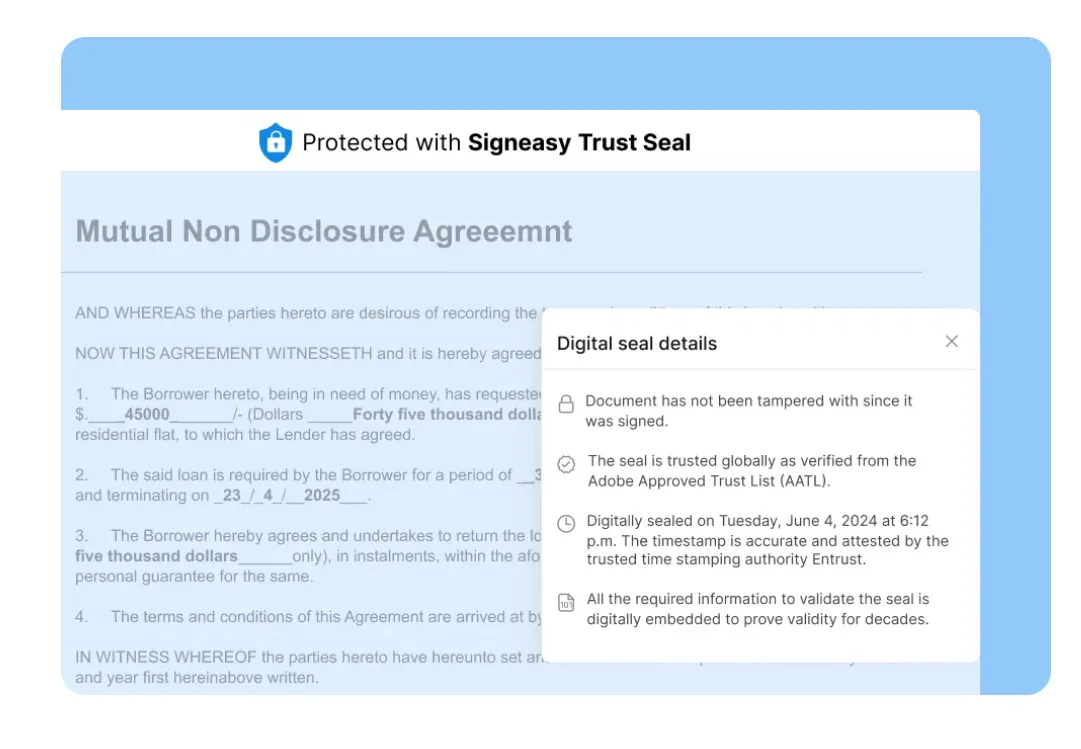
- Cross-platform and mobile-first experience: Enjoy a smooth experience on web, iOS, and Android. Includes offline access, in-person signing, and biometric verification
- Broad integration ecosystem: Works with Google Workspace, Microsoft 365, HubSpot, Dropbox, Box, OneDrive, and other top tools
- Developer- friendly API: Access a secure, versioned API and intuitive developer portal for easy system integration. Pricing is usage-based, only one credit is charged per successfully signed document, unlike other providers that bill per request sent.
- Enterprise-grade security and compliance: Includes SSO, role-based access control, two-factor authentication, and compliance with HIPAA, SOC 2, ESIGN, UETA, and eIDAS standards
- Centralized contract management: Store, search, and track contracts in a secure repository. Use dashboards, reporting, and granular team controls for better visibility.

Users love Signeasy’s seamless user experience, intuitive interface, and effortless onboarding experience
What makes Signeasy stand out:
Signeasy works smoothly even without third-party integrations, so it fits easily into any workflow. You can make advanced edits after sending a document which most tools don’t offer. Its mobile apps for iOS and Android get top ratings, and it’s even been named among the best apps for iOS 18. Customers often highlight the fast, friendly support, and the pricing is clear with no hidden fees.
Support options:
Email, Live phone support, knowledge base
G2 Rating:
2. Ironclad

Ironclad is built for legal, procurement, and enterprise teams managing complex, high-volume contracts. It helps automate workflows, reduce bottlenecks, and improve collaboration across departments while maintaining strict compliance.
Ironclad’s price:
- Uses a custom pricing approach, with many users on review platforms like G2, Capterra, and TrustRadius reporting that plans often start at around $500 per month. The exact cost depends on your team size, how complex your contract processes are, and the features you choose to include
- Free trial: Available,14 days
Ironclad is generally considered one of the more expensive options in the market, but customers often highlight that its advanced functionality and depth of features justify the higher investment.

Ironclad’s key features:
- Unified contracting workspace: Handles the entire contract lifecycle such drafting, editing, negotiation, signing, repository access, and analytics within one centralized platform
- AI-assisted review and redlining: Uses AI to detect clauses, suggest redlines, and apply company-specific negotiation playbooks for faster, more consistent reviews
- Metadata extraction and search: Automatically captures and tags critical contract data points such as parties, values, and renewal dates, enabling advanced search and organization
- No-code workflow builder: Allows legal and operations teams to create or modify contract workflows using a visual interface, with no coding required
- Browser-based Word editor: Lets you edit, comment, and redline contracts directly in your browser, with full .doc format compatibility
- Built-in eSignature and clickwrap: Includes native eSignature collection and embedded click-to-accept features to streamline execution
- Integrations with business tools: Connects with popular platforms like Salesforce, Google Drive, Microsoft Word, and Slack for smooth data sharing
- Enterprise-grade security: Complies with SOC 2 Type II and ISO certifications, uses encryption, and offers secure cloud hosting
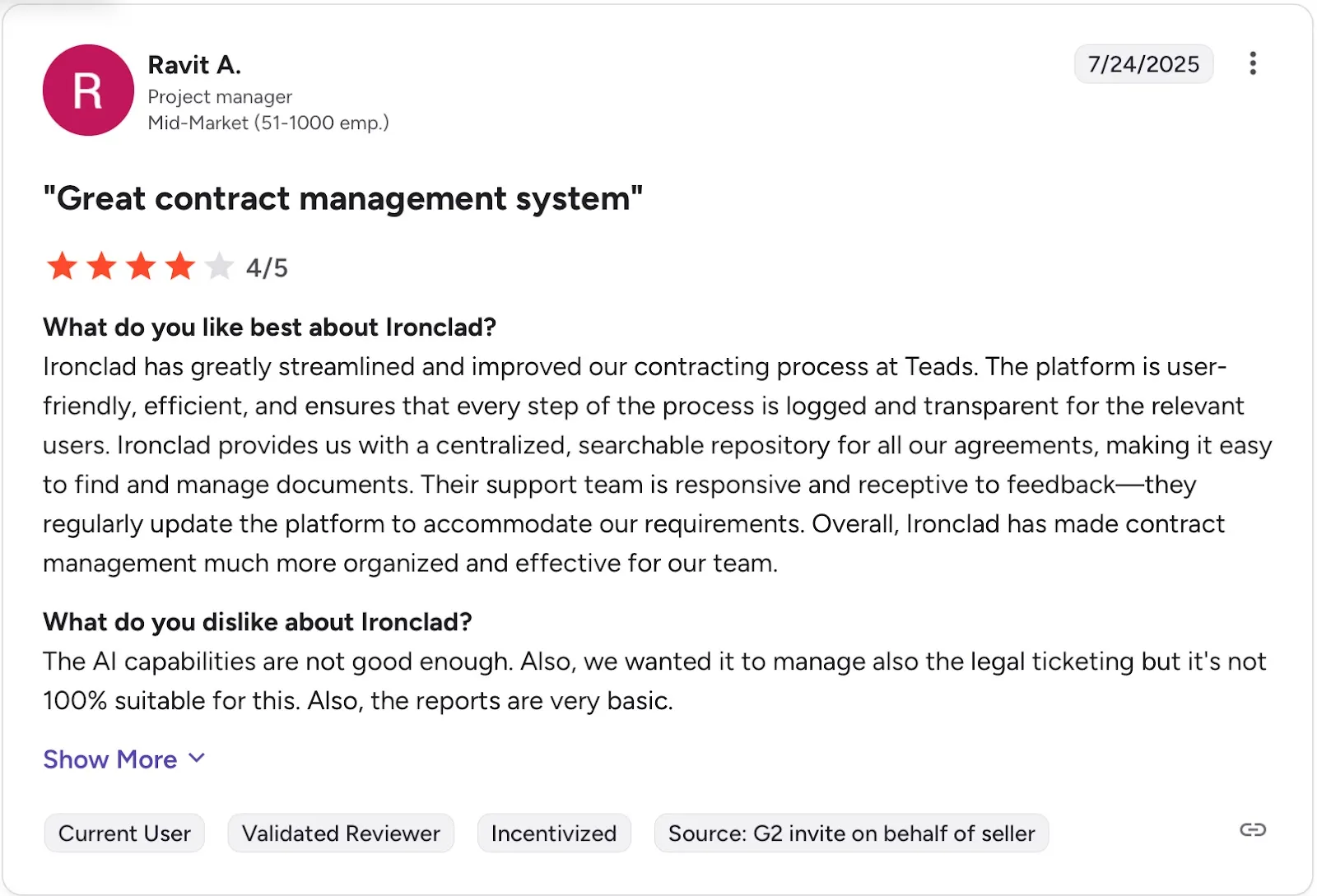
User reports streamlined and improved contracting process with Ironclad
What makes Ironclad stand out:
Ironclad enables real-time editing in Microsoft Word, offers clear post-signature visibility through intuitive dashboards, automates large-scale contract handling, and is trusted by enterprises for its strong security and compliance standards.
Support options:
Live support, knowledge-base
G2 rating:
3. Docusign CLM
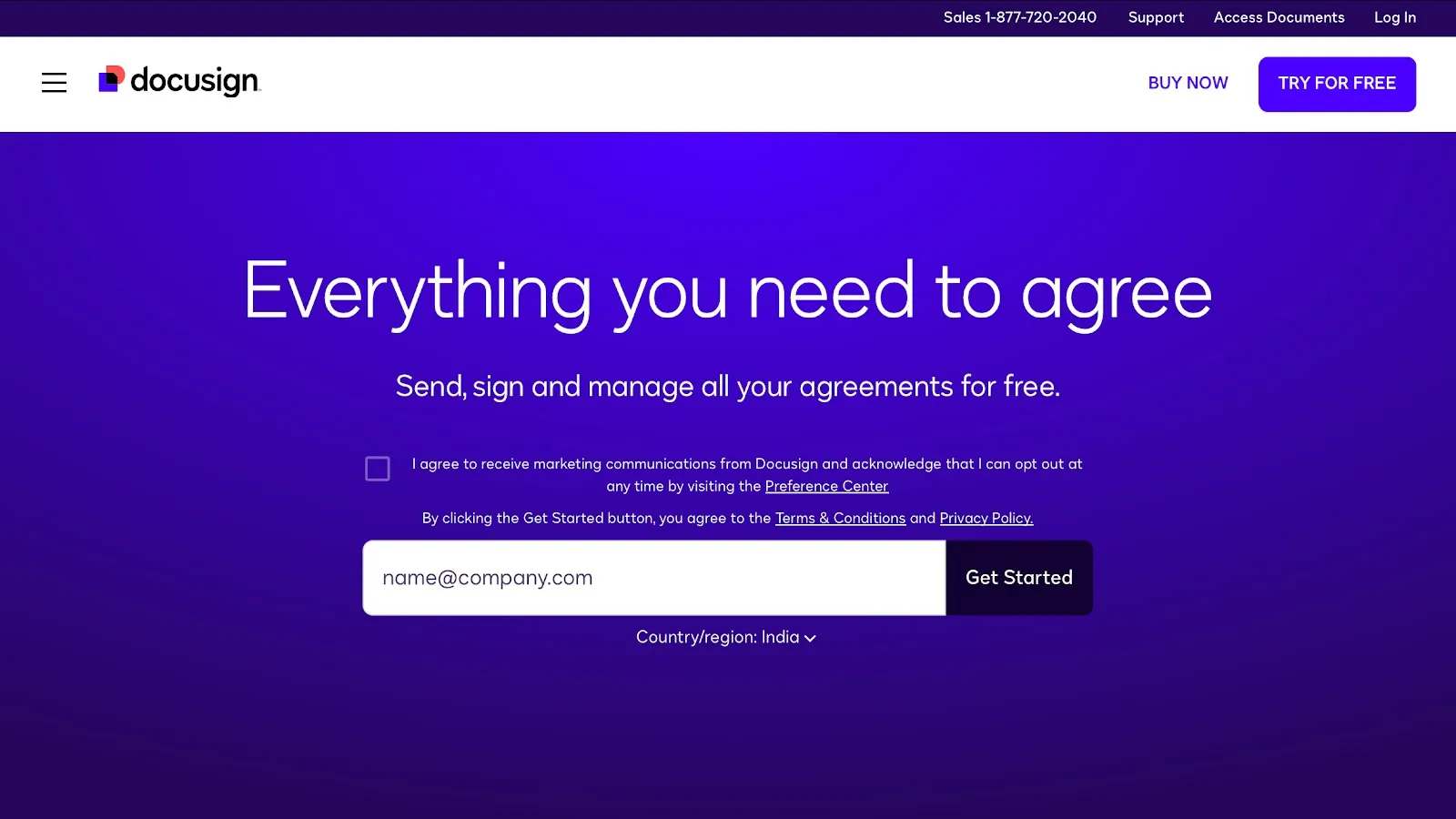
Docusign is a leading eSignature and contract workflow platform that helps businesses move faster with secure, paperless agreements. From document creation to renewal, it streamlines the entire contract process.
Docusign’s Price (user-based):
- Personal: $10/month, $120 billed yearly. Designed for individuals or sole proprietors who only need to send documents for signature occasionally
- Business: $25/month/user, $300 billed yearly. Suitable for small to mid-sized teams that collaborate frequently and require consistent document workflows
- Business pro: $40/month/user, $480 billed yearly. Ideal for larger teams managing high volumes of contracts and looking to automate parts of their process
- Enhanced plans: A custom plan offering advanced capabilities such as data synchronization, ID verification, and conditional routing
- Free Trial: Available, 30 days
Docusign’s annual plan offers better value compared to its monthly billing option, making it an attractive choice for businesses looking to save on costs. However, it requires the entire year’s payment upfront, which can be challenging for fast-growing companies or those managing tighter cash flow. While the pricing works well for established teams with predictable budgets, it may feel less flexible for organizations that need more gradual payment options.
Another concern is the lack of flexibility around cancellations — customers must notify Docusign 3–6 months in advance if they do not wish to continue, as plans auto-renew and refunds are not provided. In addition, users have reported hidden charges that only become visible in invoices, making cost predictability difficult.
Docusign’s key features:
- Embedded agreement signing via JS snippet: Supports fully embedded signing in your website or app using single JavaScript code
- Microsoft Power Automate integration: Lets users generate and send signed documents directly from automated workflows built in Power Automate using CRM or ERP data
- Accessible document review interface: Offers enhanced document review optimized for desktop and mobile, including keyboard navigation and screen reader support for users with visual impairments
- Docusign Maestro: A no-code workflow builder that automates agreement processes using drag-and-drop steps,ideal for custom contract routing and execution
- Docusign Navigator: AI-powered analytics and reporting that surface contract trends, obligations, and insights for faster decision-making
- Docusign Monitor: Provides real-time visibility into sign-in and signing behavior across an organization, enabling security alerts and compliance monitoring
- Docusign Data Verification: Verifies signer-provided data in real time using external databases, improving accuracy and reducing risk during contract signing

Users appreciate Docusign’s ease of use and their intuitive interface
What makes Docusign stand out:
Docusign is known for its strong eSignature capabilities trusted worldwide, automation that reduces administrative work and errors, and payment tracking tools that help prevent delays. It also offers a broad integration ecosystem, connecting seamlessly with platforms like Salesforce, Google, and Microsoft 365.
Support options:
Phone, e-mail, knowledge-base
G2 rating:
4. Avokaado
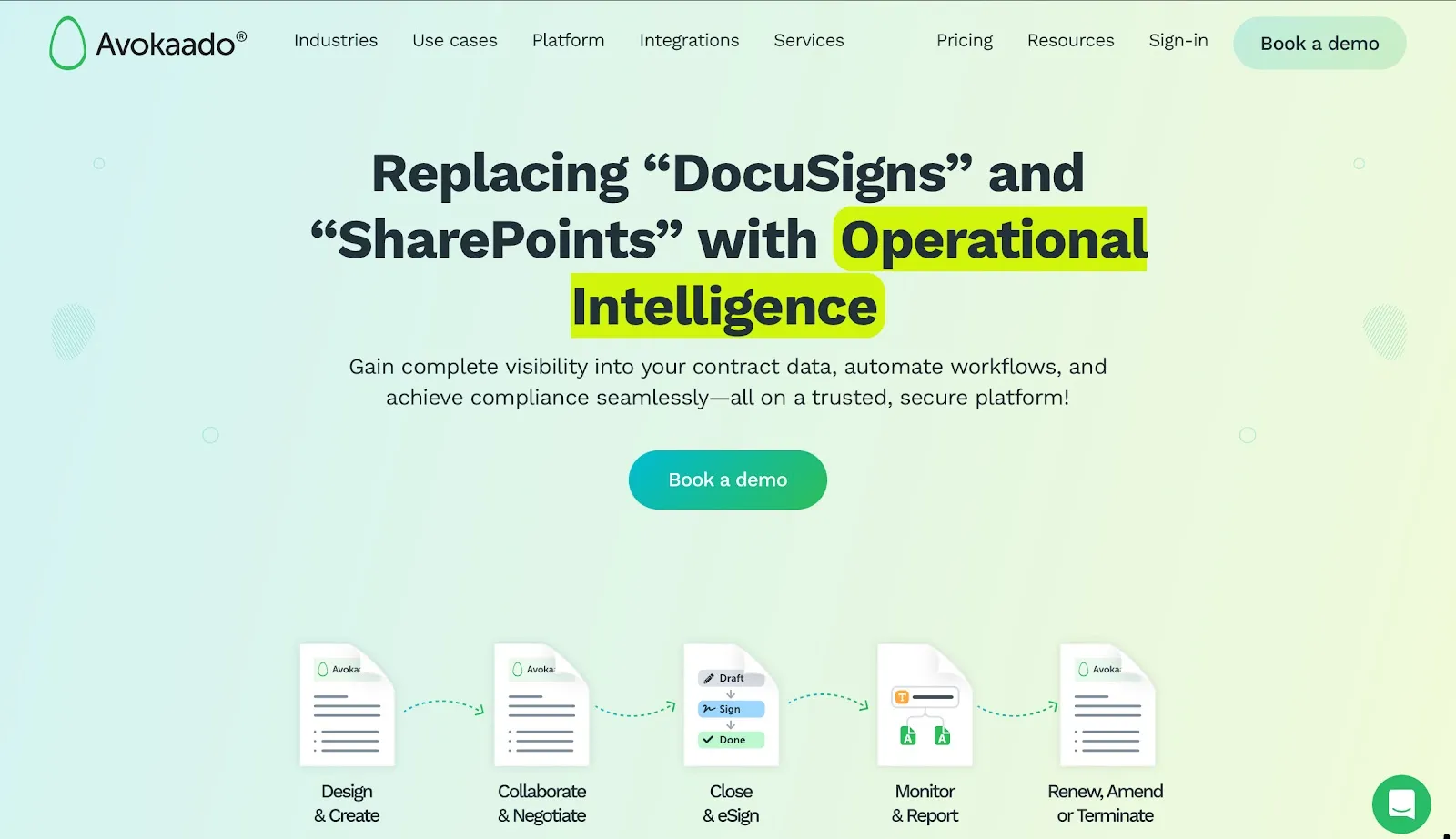
Avokaado offers a practical, automation-first solution to teams dealing with a high volume of contracts. Built for legal and HR teams, it brings structure to every stage of the contract lifecycle.
Avokaado’s price :
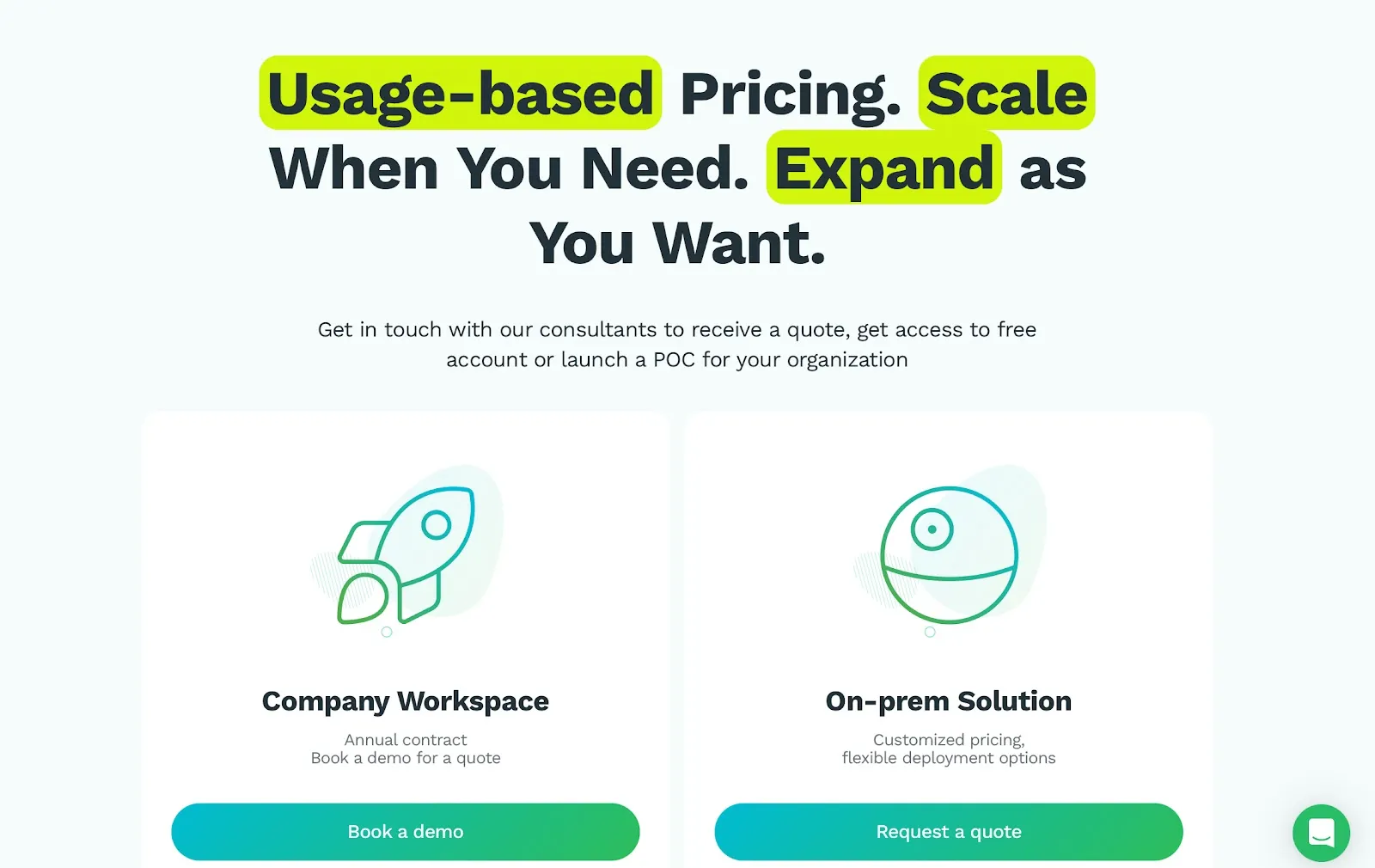
- Avokaado provides a usage-based pricing model customized to fit each organization’s requirements. Its Company Workspace plan, offered through an annual contract, comes with advanced tools like document automation, AI-powered data extraction, and CRM integration. An On-prem Solution is available on request for companies wanting enhanced security
- Free trial: Available, 7 days
Avokaado’s key features:
- Clause-based contract automation: Automates even complex contracts using modular clauses, dynamic variables, and conditional logic all without coding. Updates to clauses propagate across templates and documents
- Party management for reusable relationships: Stores detailed profiles for repeat parties like employees or vendors with contact info and identifiers. Streamlines reuse and cuts manual entry errors by up to 90%
- Central document workspace with bilingual support: Provides a secure, branded workspace for all teams, with support for multilingual document generation (e.g., bilingual contracts) and format exports (PDF, DOCX)
- Built-in negotiation tools and data intake forms: Negotiation and collaboration occur directly in the platform, with integrated discussion boards, version tracking, and dynamic data collection forms to populate contract templates
- Operational Intelligence dashboards and smart workflow triggers: Dashboards offer real-time visibility into contract activity and obligations across business units. Intelligent triggers help auto-generate contracts using data from earlier documents
- Secure integrations with CRM, HRIS, and custom APIs: Connects to Salesforce, BambooHR, Personio, and others through built-in integrations or a REST API. Enables smooth data sync for workflows in HR and revenue operations
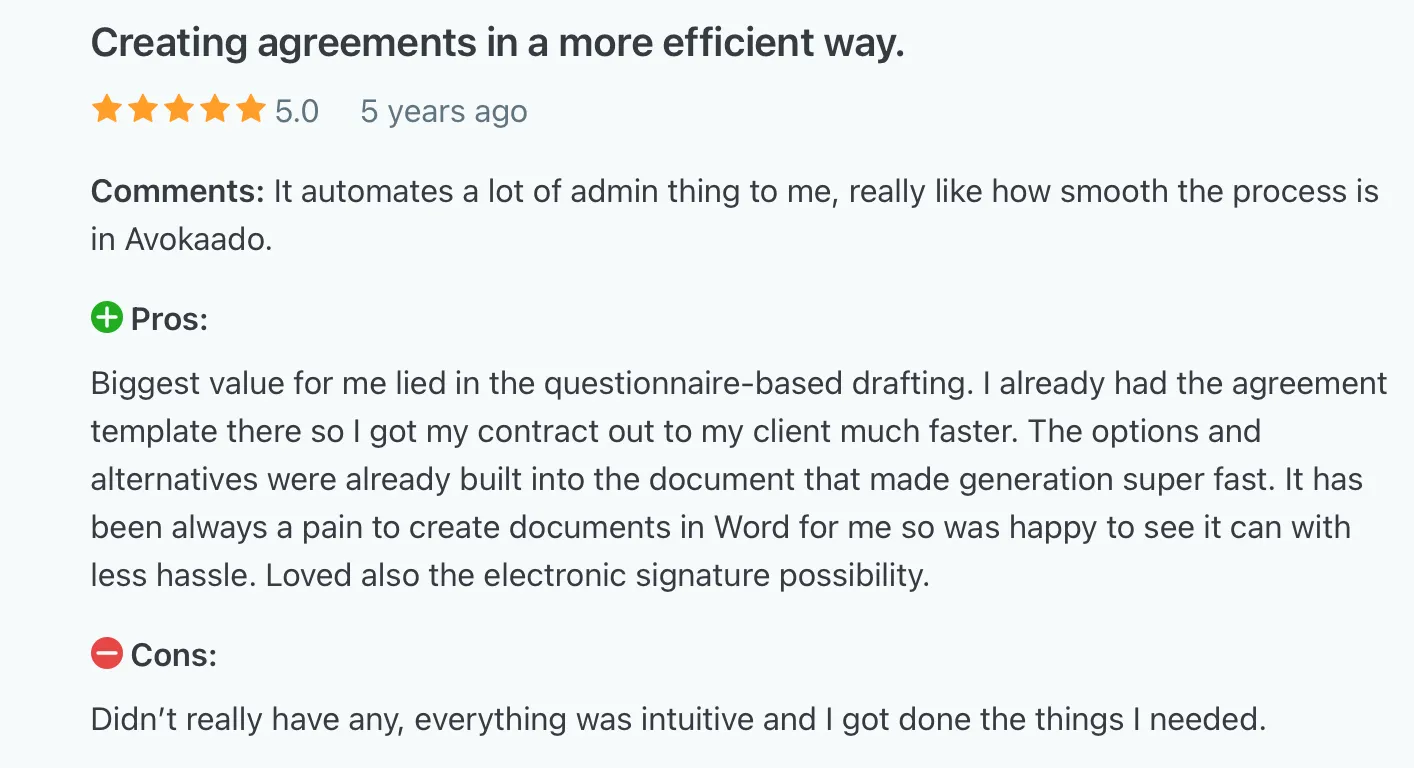
Users express love for Avokaado’s comprehensive features
What makes Avokaado stand out:
Avokaado offers clause-based drafting that maintains legal consistency across all documents, making it especially suited for legal and HR teams handling large volumes of routine contracts.
Support options:
Chat, email, FAQs
G2 rating:
No rating
5. Revnue

Revnue is an all-in-one CLM tool useful for teams juggling a high volume of vendor, customer, and employee contracts across departments. It also integrates with core business systems like Salesforce and Microsoft 365 for smoother workflows.
Revnue’s Pricing:
- Not available publicly
- Free trial: Available, 30 days
Revnue’s key features:
- Smart repository and unified dashboard: Centralizes contracts, assets, suppliers, and customer data, all in one searchable view
- AI-powered contract authoring and automation:Offers smart drafting with clause libraries, drag-and-drop contract creation, bulk redlining, real-time co-editing, and automated routing
- Automated metadata extraction and alerts: Automatically tags contract details (expiry, terms, risk indicators) and surfaces them in dashboards with customizable alerts
- End-to-end lifecycle tracking:Covers pre-signature drafting, eSignature collection, and post-signature monitoring via an integrated workflow and dashboard
- Integrated supplier and procurement management: Enables supplier onboarding, contract milestone tracking, performance monitoring, and spend analysis for procurement teams
- Extensive system integrations: Connects with ERP, CRM, HRIS, and supply chain tools for unified operations and data consistency
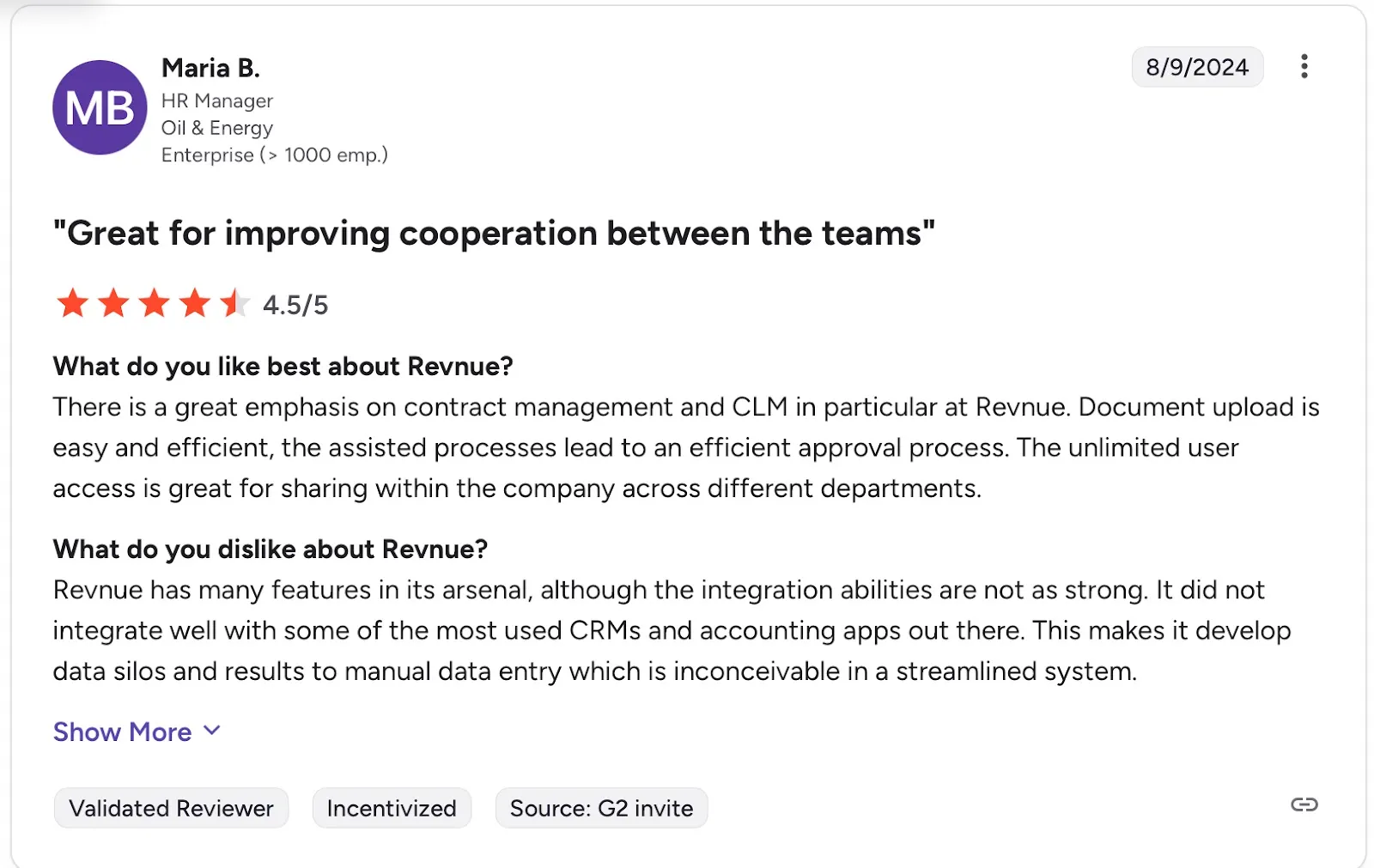
Users love Revnue’s unlimited user access but express issues with integration
What makes Revnue stand out:
Revnue offers AI-powered contract extraction that makes digitizing records fast and accurate, saving time on manual data entry. It also provides strong support for managing multiple contract types across departments and regions, making it suitable for diverse business needs.
Support options:
Email, knowledge-base, phone
G2 rating:
6. HyperStart
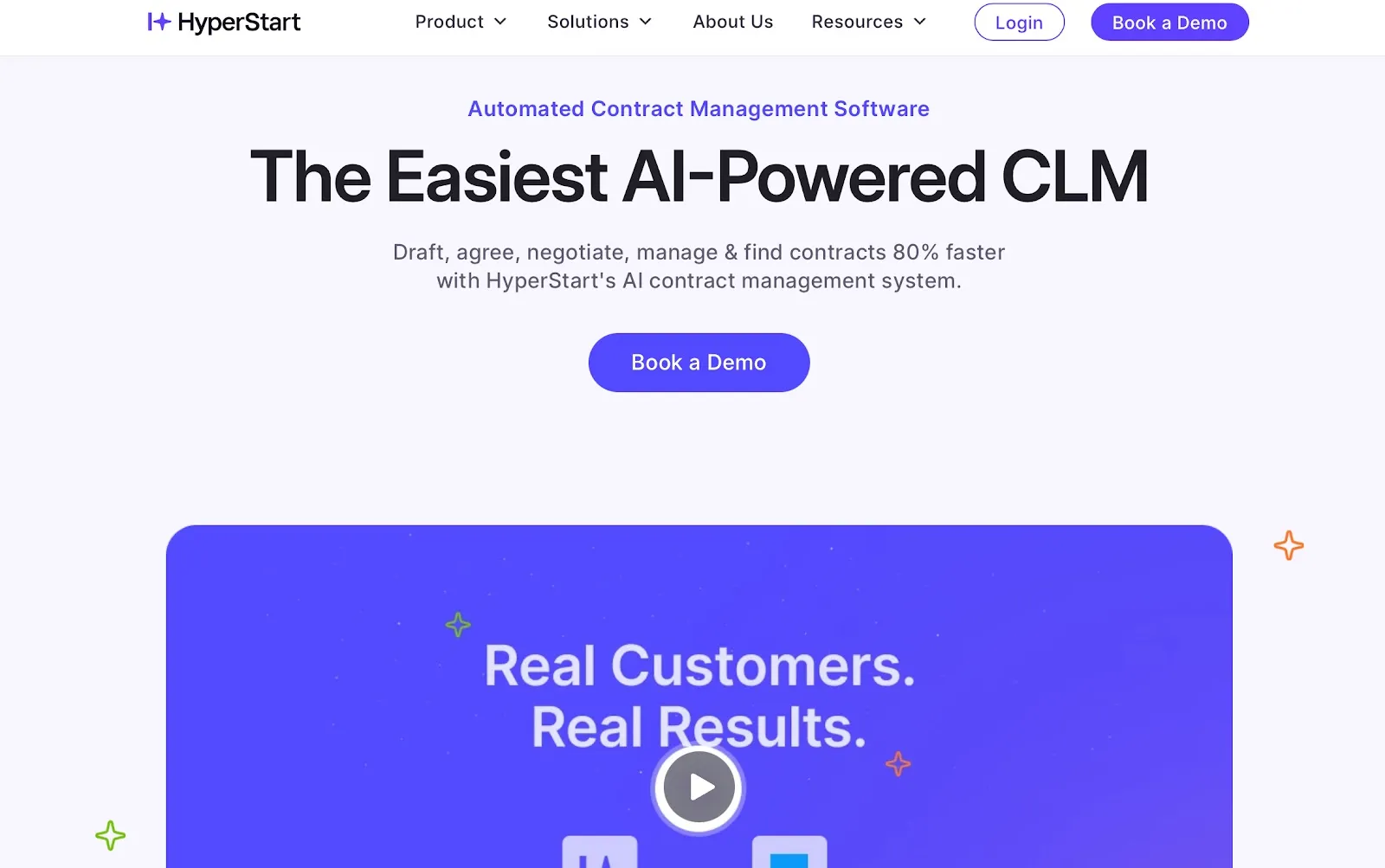
HyperStart is built for startups and small businesses that want simple, fast, and budget-friendly contract workflows. With an AI-powered editor and mobile-first design, it removes friction from the contract lifecycle without the steep learning curve.
HyperStart’s Pricing:
- Not available publicly
- Free trial: Available, 14 days
HyperStart‘s key features:
- AI-powered contract repository: Quickly import legacy contracts with a single click and use machine learning to extract 30+ key terms, no manual tagging needed
- AI for contract creation and negotiation: Accelerate contract drafting with dynamic templates and smart intake forms. Use AI to redline, review, and suggest edits in real time, including on counterparty drafts
- Centralized contract visibility with “in-flight” dashboard: Monitor all ongoing contracts through in-flight dashboards. Get real-time insights on review times, approval status, and bottlenecks to act faster
- No-code automation for approvals: Build approval workflows using visual builders. Set conditional routing, reminders, and auto-tracking without coding
- Legal-domain-aware risk tracking: Use AI to flag risky clauses, missed obligations, and non-compliant language. Visual dashboards keep risk management data accessible
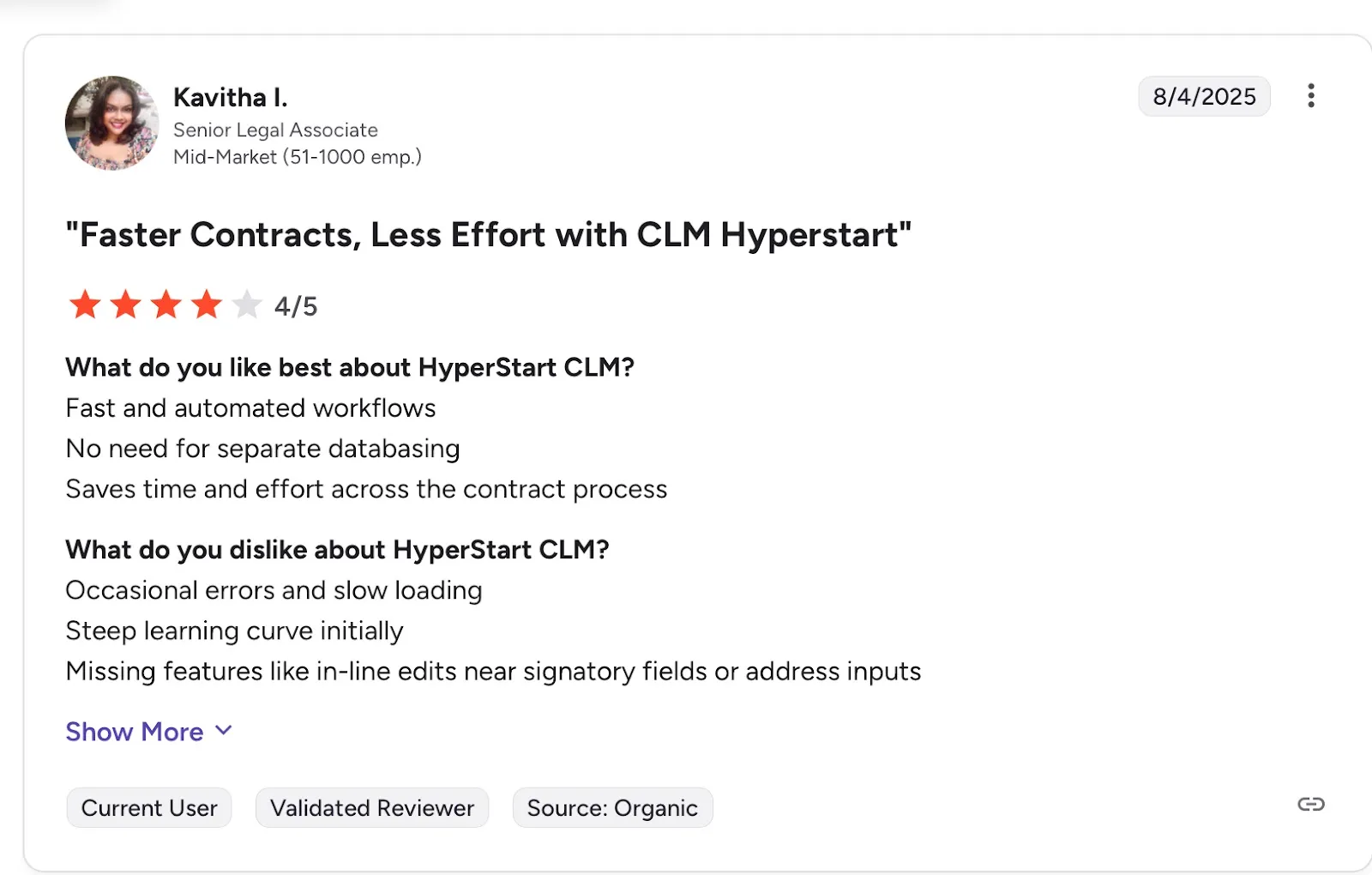
Users admire HyperStart for speed, but at the same time report a steep learning curve
What makes Hyperstart stand out:
Hyperstart is built for remote, fast-moving teams, with AI capabilities that suggest contract edits based on clause intent and structure, helping streamline review and approval processes.
Support options:
Email, helpcenter
G2 rating:
7. PandaDoc
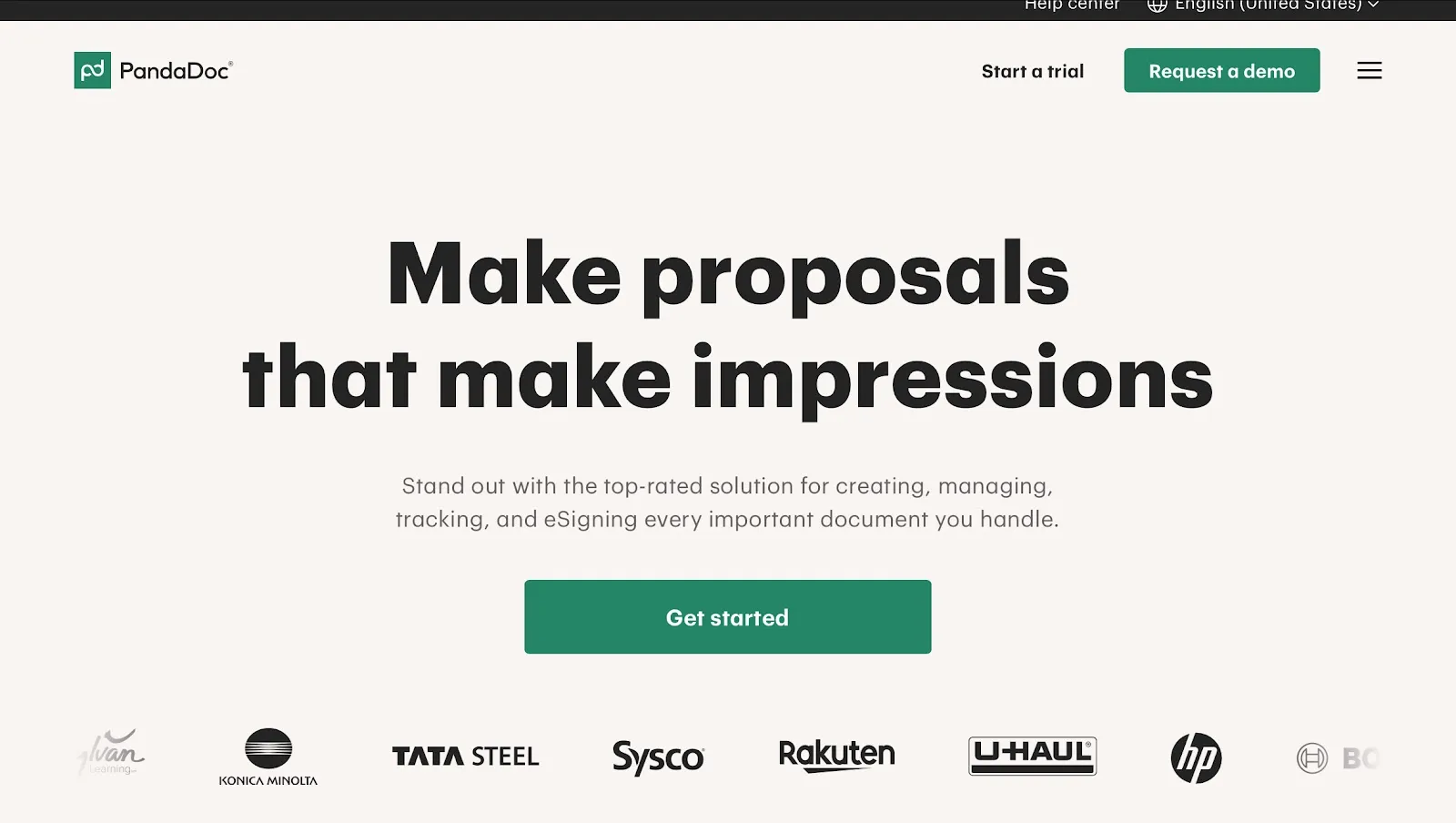
PandaDoc is a versatile document automation and contract management tool best suited for sales, marketing, and revenue teams. It simplifies everything from document creation to eSignatures, helping you close deals faster and reduce manual effort.
Pandadoc’s price (user-based):
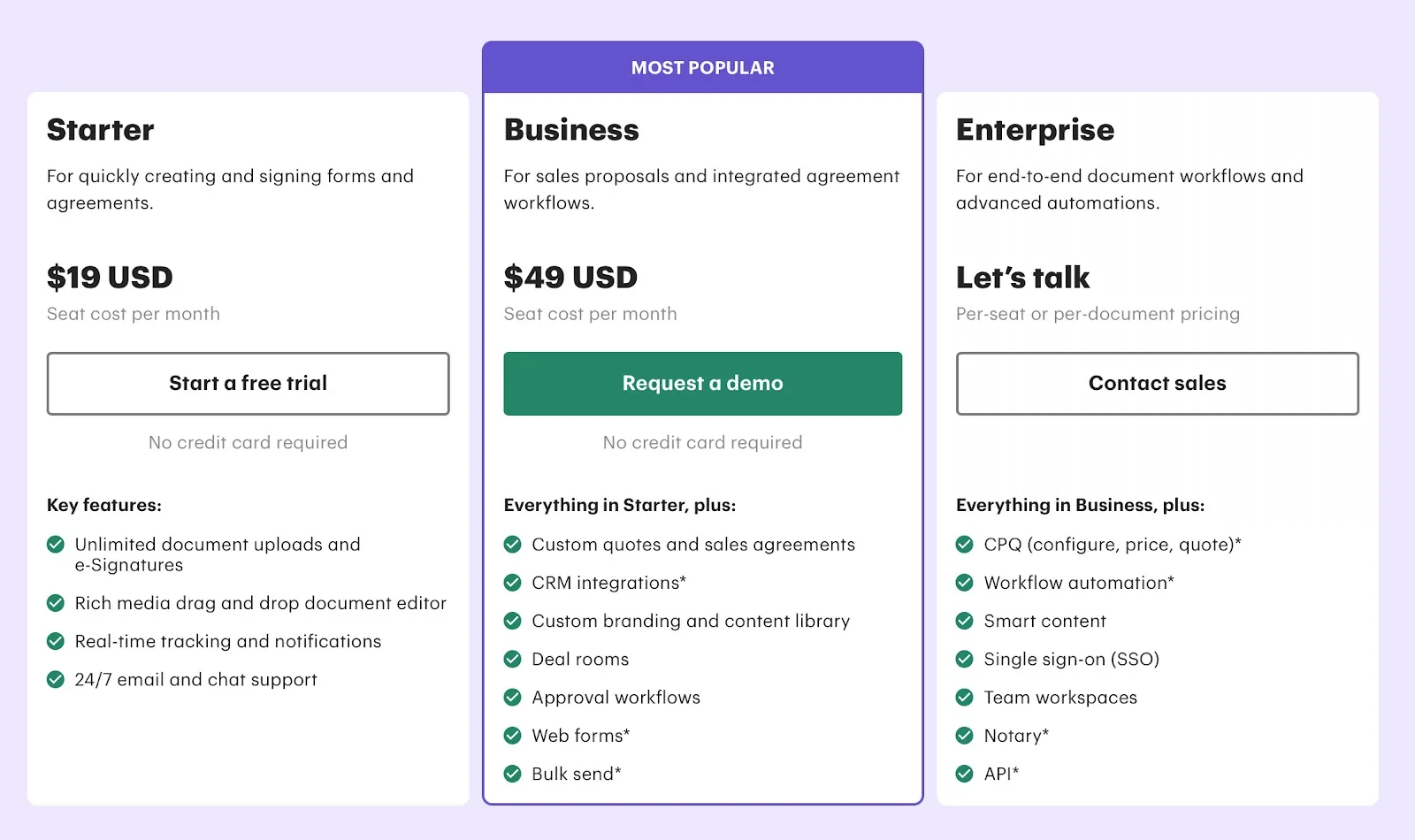
- Starter: $19/month/seat. Ideal for basic eSignature needs. Includes unlimited eSignatures, signing orders, and in-person signing for face-to-face transactions
- Business: $49/month/seat. Builds on the Starter plan with bulk sending for high-volume workflows and optional email whitelabeling for brand consistency
- Enterprise: Designed for large teams or complex workflows. Adds customizable signing workflows, advanced automations, and API access to embed eSignatures into your systems. Comes with custom pricing and may require long-term commitments. Pricing can also rise significantly as you scale, especially for automation, advanced security, and API usage
- Free Trial: Available, 14 days
While PandaDoc’s feature set is strong, some users find that essential tools like certain integrations, advanced automation, and premium support often push them into higher-cost plans. Pricing can increase notably as requirements scale, and some advanced capabilities such as conditional logic, external contract negotiation, and automatic updates for edited contracts are missing, which can limit efficiency for complex use cases.
PandaDoc’s key features:
- Drag-and-drop document builder and content library: Build contracts, proposals, and quotes quickly using reusable blocks and editable templates, all within a rich visual editor
- Guided CPQ inside CRM: Automate quote creation directly in HubSpot or Salesforce using guided pricing logic and approval rules
- Embedded template editing: Edit templates directly within integrated apps (e.g., Greenhouse) with no back-and-forth switching
- Multiple identity verification options: Support secure signing with knowledge-based authentication, ID checks, SMS codes, and face-matching
- Integrated payment capabilities: Collect payments via Stripe, ACH, PayPal, or recurring installments directly within documents
- Bulk send with variable data via CSV: Send customized documents at scale using CSV-based mail merge and template variables
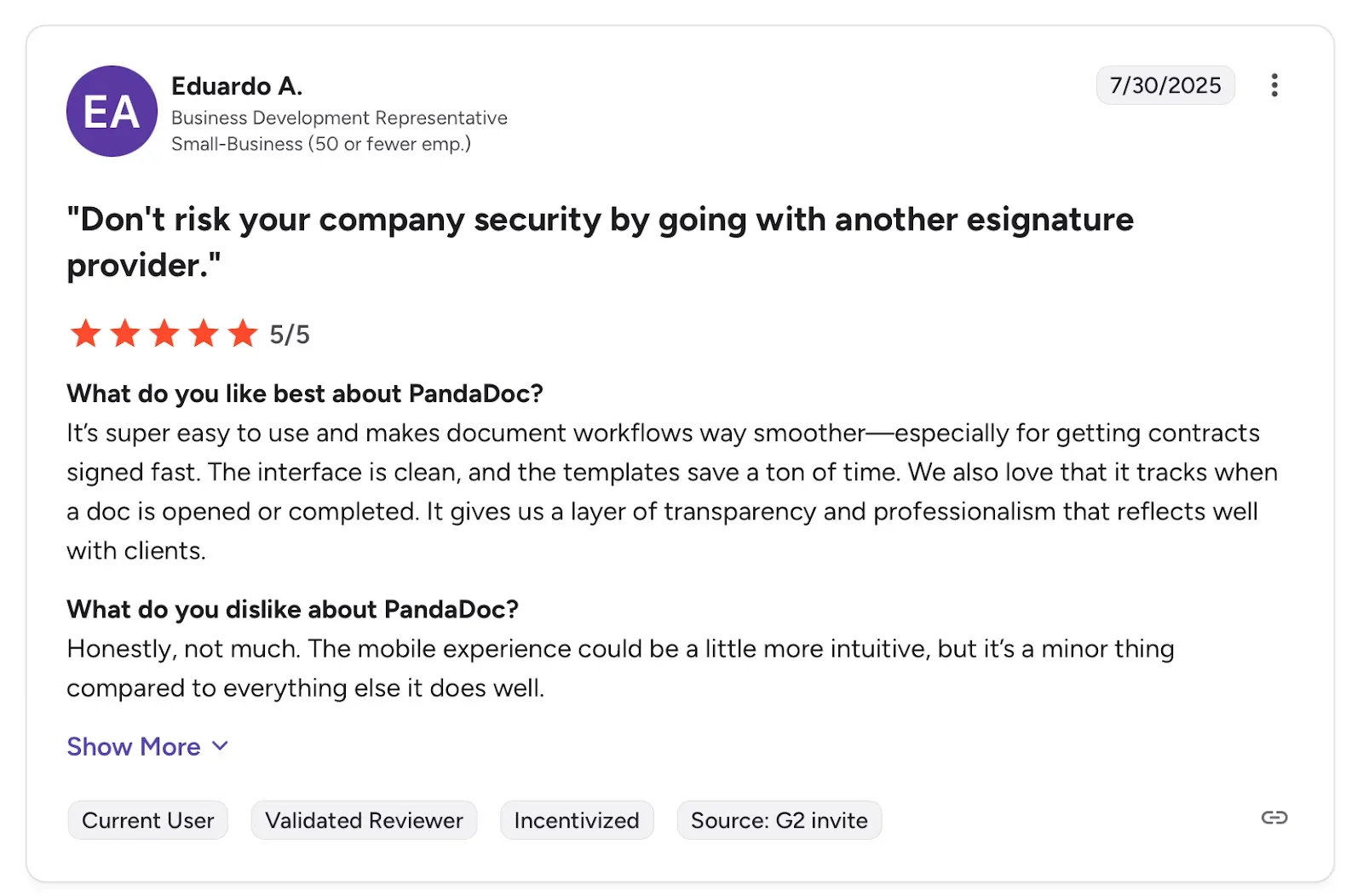
Users love PandaDoc’s straightforward interface
What makes PantaDoc stand out:
PandaDoc offers interactive quotes and pricing tables that let buyers choose options directly within the contract. A built-in content library and reusable templates further speed up document creation across teams, ensuring consistency and efficiency.
Support options:
Email, chat, knowledge base
G2 rating:
8. ContractWorks
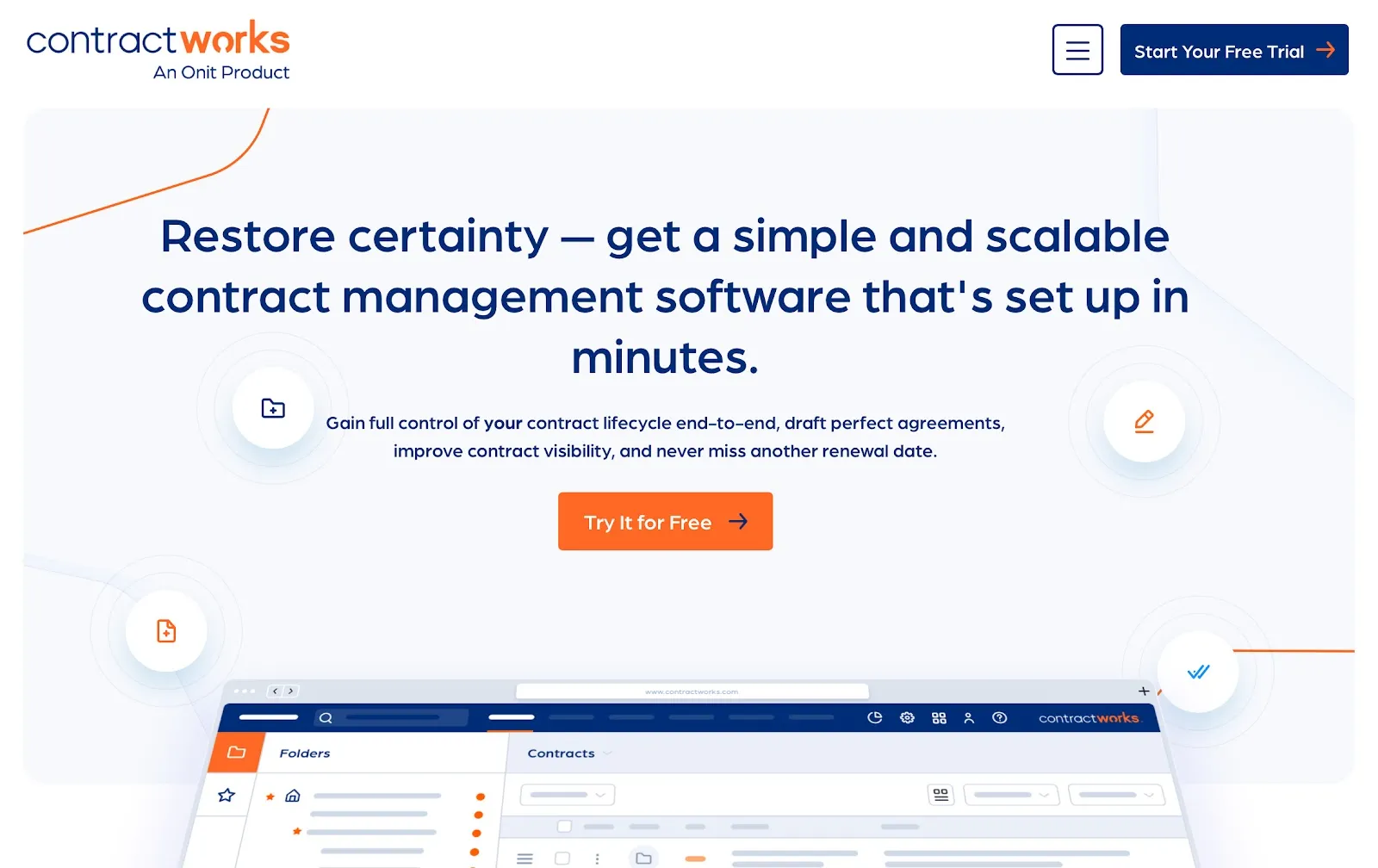
ContractWorks is a straightforward, no-frills contract management solution built for businesses that want speed, simplicity, and control. It’s particularly useful for small to mid-sized legal teams looking to manage high volumes of contracts without the complexity of enterprise tools.
ContractWork’s price:
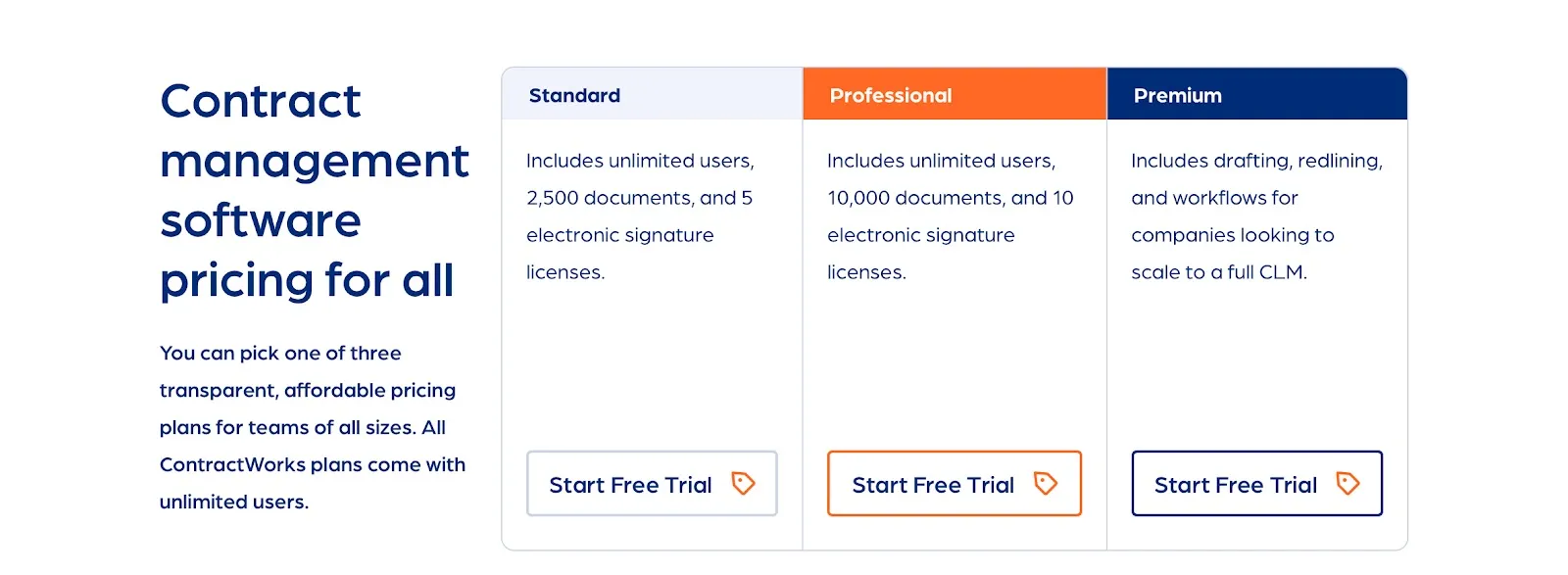
- Standard plan: Starts at $700/month. Suitable for individuals with low-volume signing needs, supports up to 5 documents for signature
- Professional plan: Starts at $900/month. Great for mid-sized businesses needing unlimited document signing, reminders, notifications and commenting
- Premium plan: Starts at $2,000/month. Businesses needing advanced signing capabilities, attachments, and bulk sending can opt for this plan
- Free trial: Available, 14 days
ContractWorks can be cost-effective for mid-to-large businesses with lots of users. However, smaller organizations or those with fluctuating contract volumes may find the rigid, relatively high entry-pricing and feature bundling not the best value.
ContractWork’s key features:
- AI auto-tagging and smart document tagging: Automatically tags key contract details like effective dates, renewal dates, and contract types on upload, speeding up implementation and enabling immediate search and reporting
- OCR with smart contract outline and snippet view: Enables extraction of text from scanned documents and auto-generates a section-based outline for quick navigation. The snippet view lets users review tagged content in context
- Custom tagging and reporting with color coding: Allows users to assign custom, multi-value tags and highlight important contract clauses using colors, improving visibility and customization in reporting
- Milestone alerts and notifications: Sends notifications and reminders based on key contract milestones (e.g., renewals, expirations), helping users stay proactive
- Intuitive folder-based repository with role-based access: Organizes contracts in a drag-and-drop repository with granular access controls to secure sensitive documents and support self-service
- Quick contract generation from templates: Streamlines drafting by enabling creation of contracts via pre-approved templates or smart questionnaires

Users find ContractWorks simple and scalable
What makes ContractWorks stand out:
ContractWorks is designed for fast deployment, with minimal onboarding needed for teams to get started quickly. Its smart tagging and OCR-based search make locating specific clauses or terms straightforward, while automated alerts and reminders ensure critical renewals and deadlines are not missed.
Support option:
24/7 support for all members
G2 rating:
9. Concord
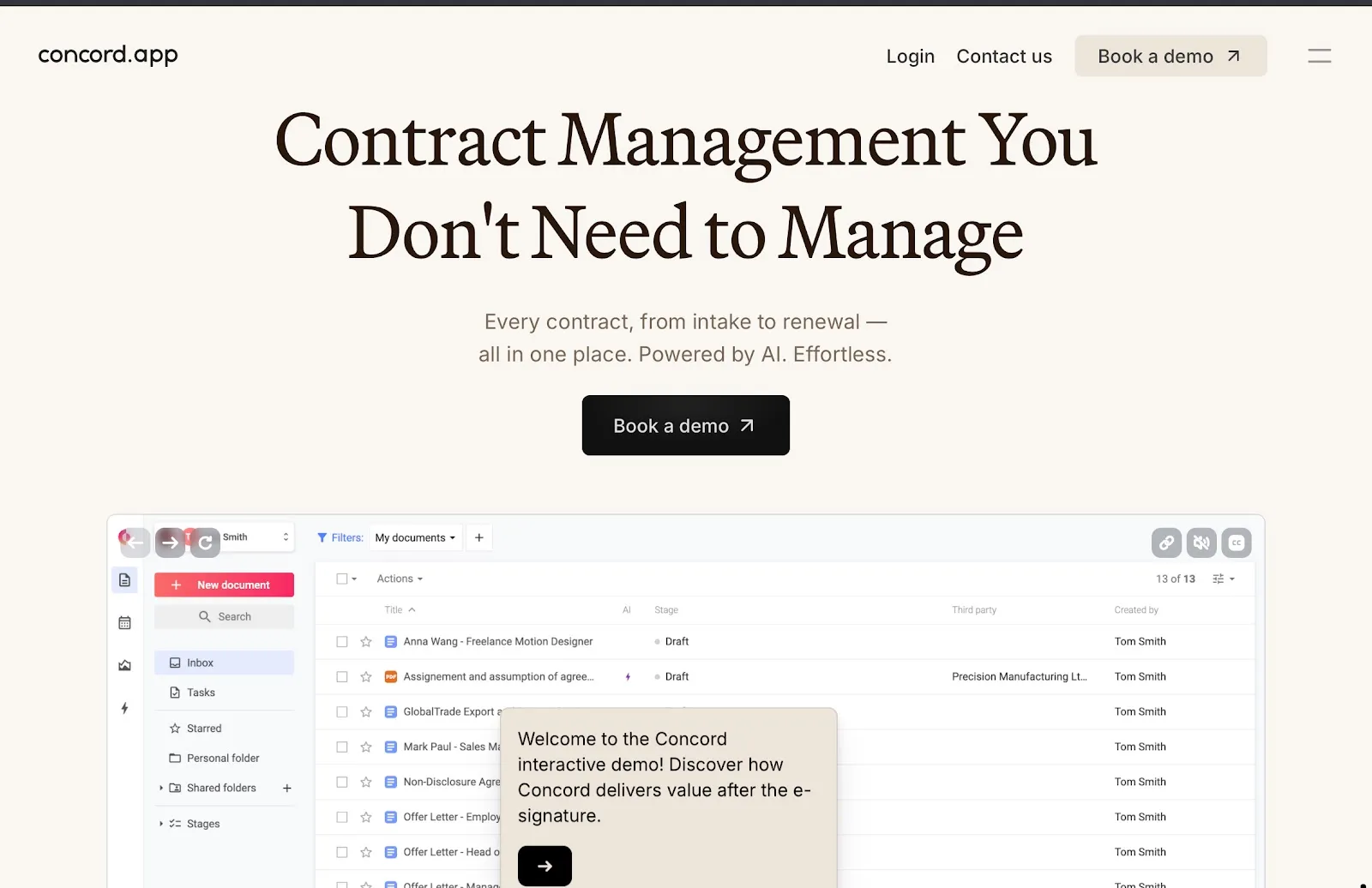
Concord is a cloud-based contract lifecycle management platform designed to simplify every stage of the contracting process. It’s well-suited for teams that need robust collaboration features and legal compliance without a steep learning curve.
Concord’s Price:
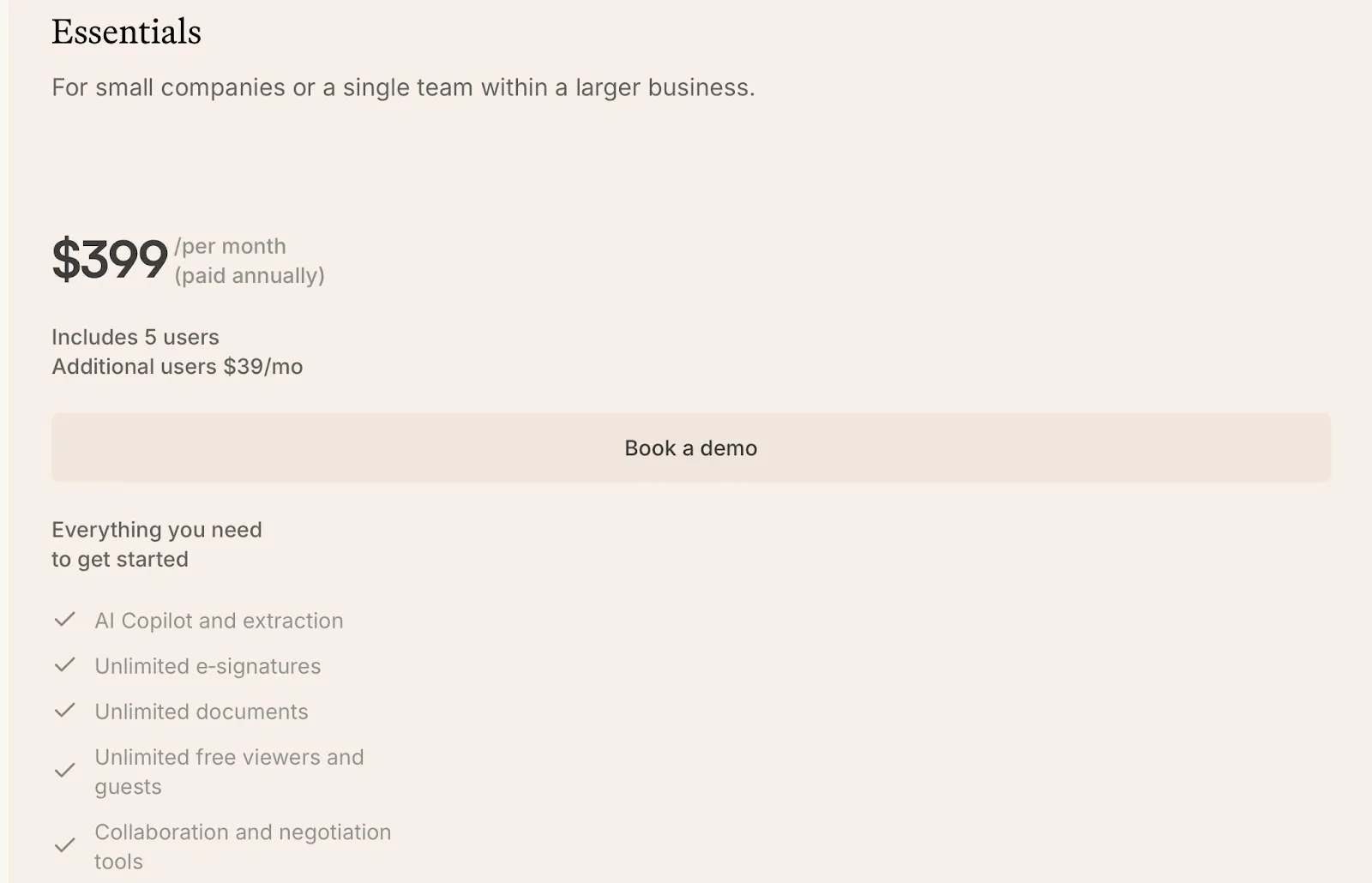
- Essentials: $399/month (paid annually), includes 5 users. Suitable for small companies or single teams and offers unlimited eSignatures, unlimited documents
- Business: $699/month (paid annually), includes 5 users. Suited for businesses deploying Concord across several teams, includes customized reports, and integrations with Salesforce
- Enterprise: Custom pricing designed for larger enterprises with complex support and deployment needs
- Free trial: Concord does not advertise a standard free trial on its official site or pricing pages. Instead, it offers a demo request option where potential users can see the platform in action
Concord balances a good feature set with scalable pricing geared toward small to mid-sized businesses but may not suit those seeking simplicity, flawless user experience, or cost-effective plans for smaller teams.
Concord’s Key features:
- Self-serve intake forms: Enables business users to request contracts via legal-approved templates, eliminating email or spreadsheet chaos
- In-browser drafting, redlining, and collaboration: Offers real-time editing, inline comments, tracked changes, version control, and eSignature within the platform
- AI insights and proactive alerts: Delivers AI-backed insights on risks, obligations, and renewal dates, plus syncs deadline reminders to your calendar
- Bulk upload with AI extraction: Lets you drag-and-drop documents, including scanned files, and instantly populates searchable metadata like payment terms and deadlines
- Unlimited approval workflows: Supports fully customizable, repeatable review and approval flows at scale
- Advanced security and data control: Meets enterprise compliance standards (e.g., SOC 2, GDPR, ISO); includes encryption, audit logs, and role-based access
- Deep integration options: Connects with tools like Salesforce, HubSpot, Slack, Google Drive, Microsoft Word, and over 5,000 more apps via Zapier
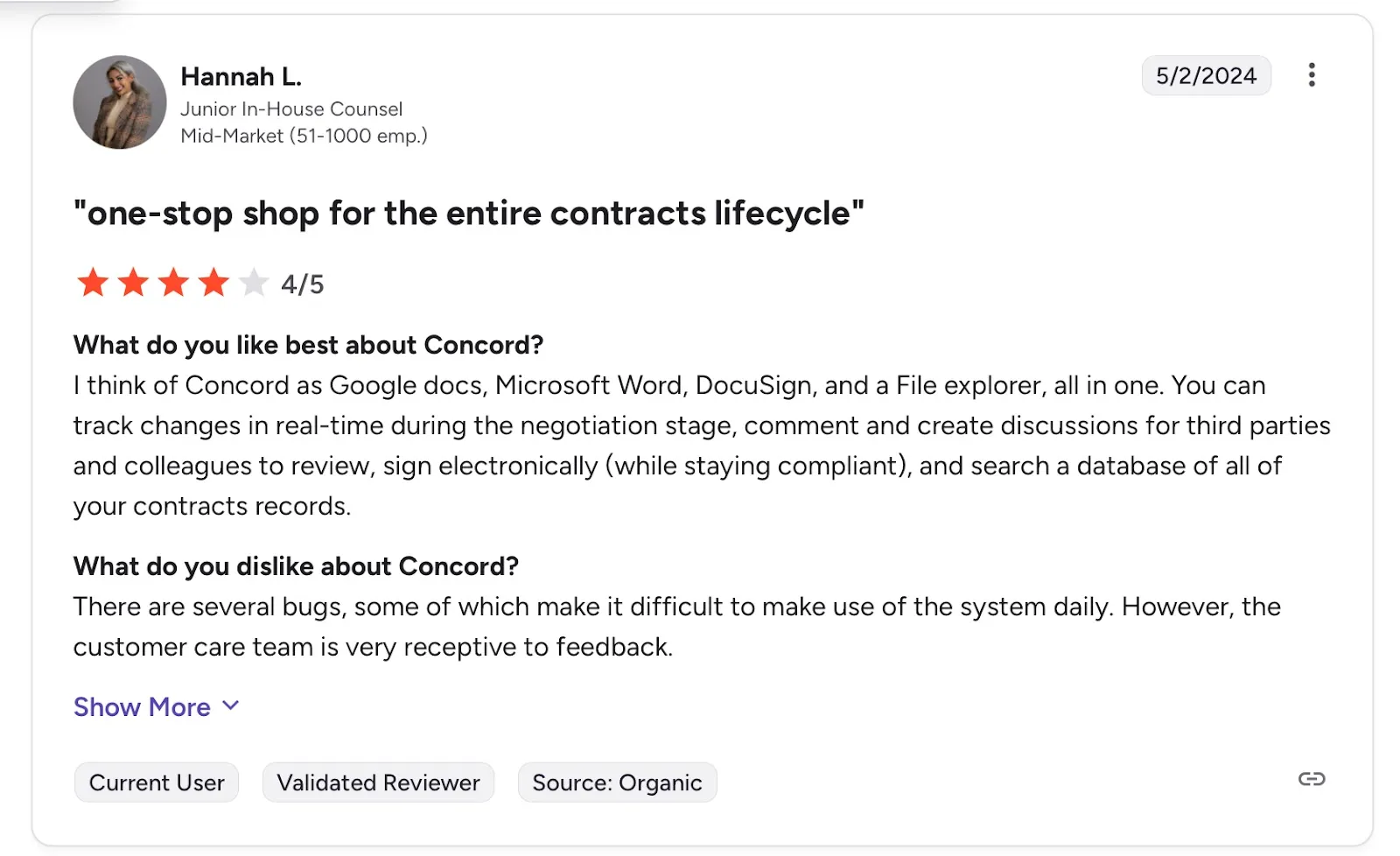
A user describes Concord as a one-stop shop for the entire contract lifecycle
What makes Concord stand out:
Concord offers unlimited contracts and eSignatures in all plans, making it suitable for teams managing high volumes of agreements without extra charges. Its real-time document editing and collaboration features help reduce delays in legal and sales workflows, while the built-in chat keeps all contract-related communication centralized and transparent.
Support options:
24/7 assistance
G2 rating:
10. airSlate SignNow
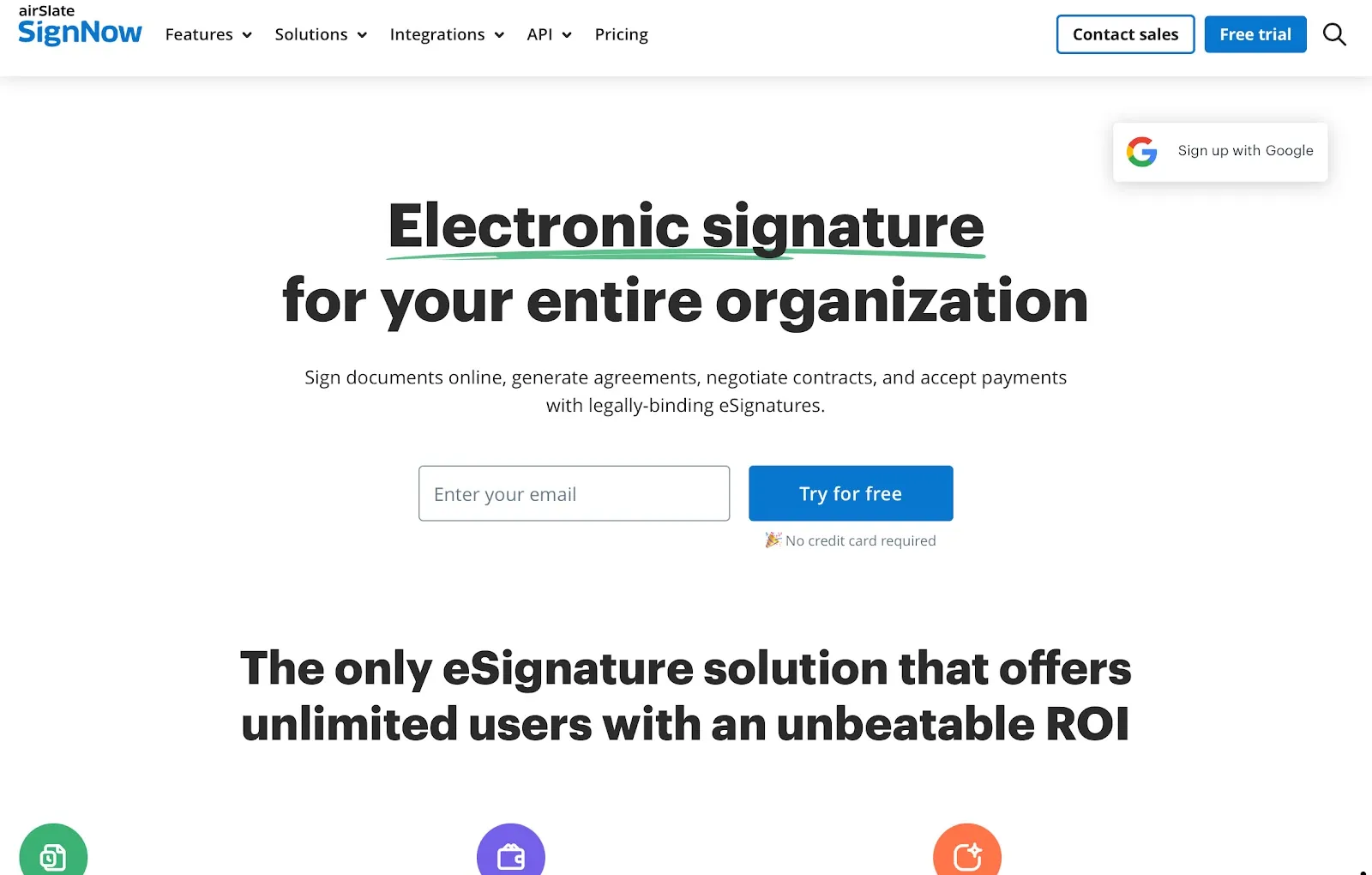
SignNow, now branded as airSlate SignNow, is part of the larger airSlate business automation ecosystem. While SignNow focuses on fast, legally binding e-signatures, airSlate expands its capabilities with workflow automation, document generation, and integrations. This makes SignNow a flexible solution that caters to both small teams needing a simple signing tool and enterprises looking for scalable, automated document workflows.
airSlate SignNow’s pricing:
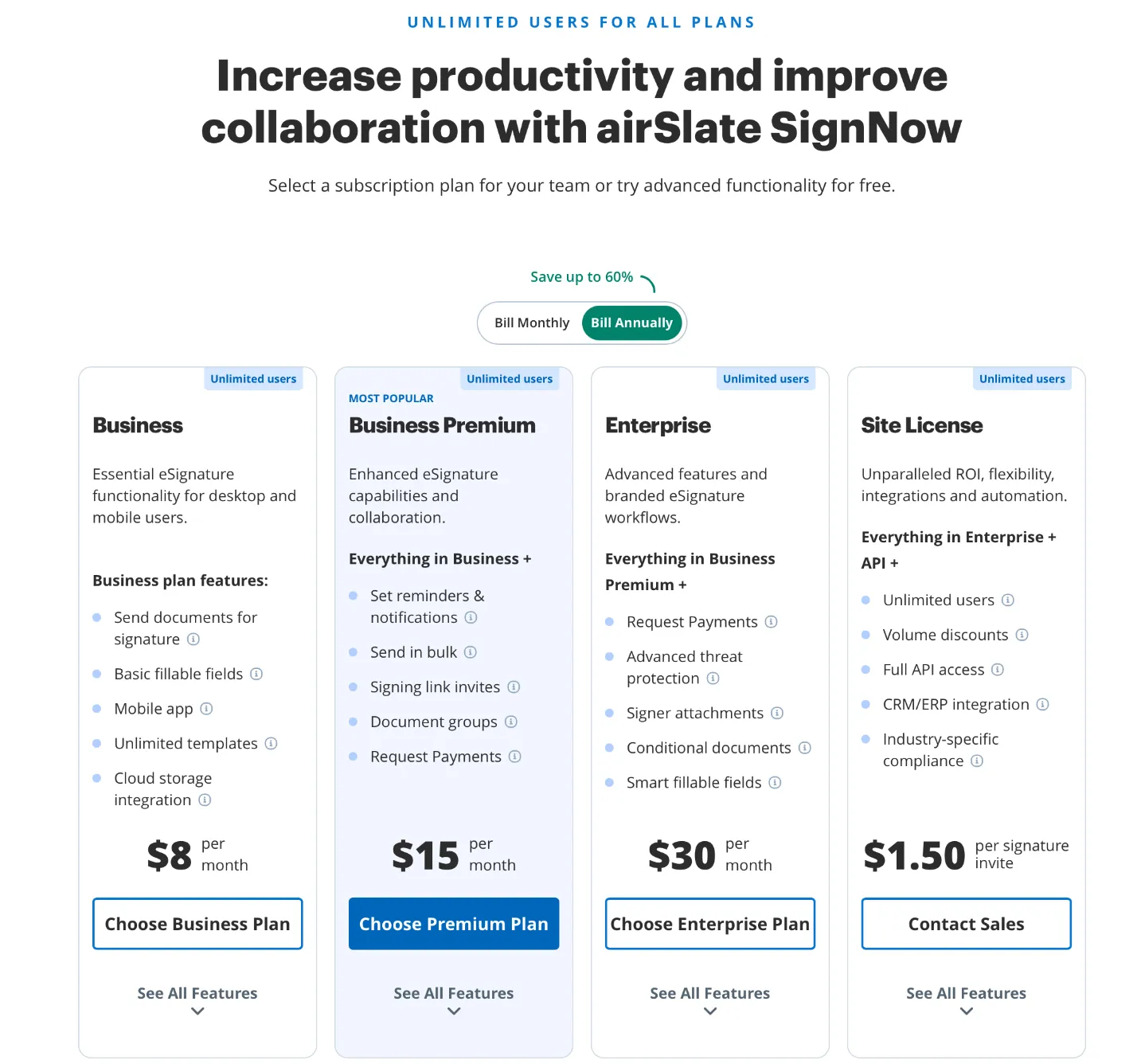
- Business: Starts at $8 per user/month when billed annually.Best for freelancers, startups, and small businesses that just need reliable e-signatures with essential features like mobile app access, basic fillable fields, and cloud storage integration
- Business premium : $15 per user/month. Suited for growing SMBs and mid-sized teams that require collaboration tools such as reminders, bulk sending, document groups, and payment requests
- Enterprise: $30 per user/month. Designed for enterprises that need advanced features like branded workflows, conditional documents, smart fillable fields, advanced threat protection, and signer attachments
- Site License: $1.50 per signature invite. Ideal for large organizations with high-volume signing needs. Includes unlimited users, volume discounts, full API access, CRM/ERP integration, and industry-specific compliance
- Free trial: Available, 7 days
SignNow offers some of the most affordable entry-level plans in the market, making it attractive for startups and SMBs. However, as you move up to higher tiers, the cost can add up, especially if you need advanced automation or custom branding. For teams with simple e-signature needs, it’s a budget-friendly option, but larger organizations may find themselves evaluating whether the site license or enterprise plan justifies the spend compared to alternatives.
airSlate SignNow’s key features :
- Kiosk mode for in-person signing: Collects multiple signatures in-person on a single device, ideal for healthcare, retail, or field services
- Payment collection via signature forms: Lets you request and collect payments directly through signed documents using integrations like Stripe
- Offline signing: Enables users to sign documents without an internet connection, automatically syncing once reconnected
- Bulk sending: Send the same document to hundreds of recipients at once and track responses in real time
- Conditional fields: Dynamically display or hide fields based on prior inputs, ensuring accurate data collection
- Team collaboration features: Allows administrators to create teams, manage roles, and share templates within departments
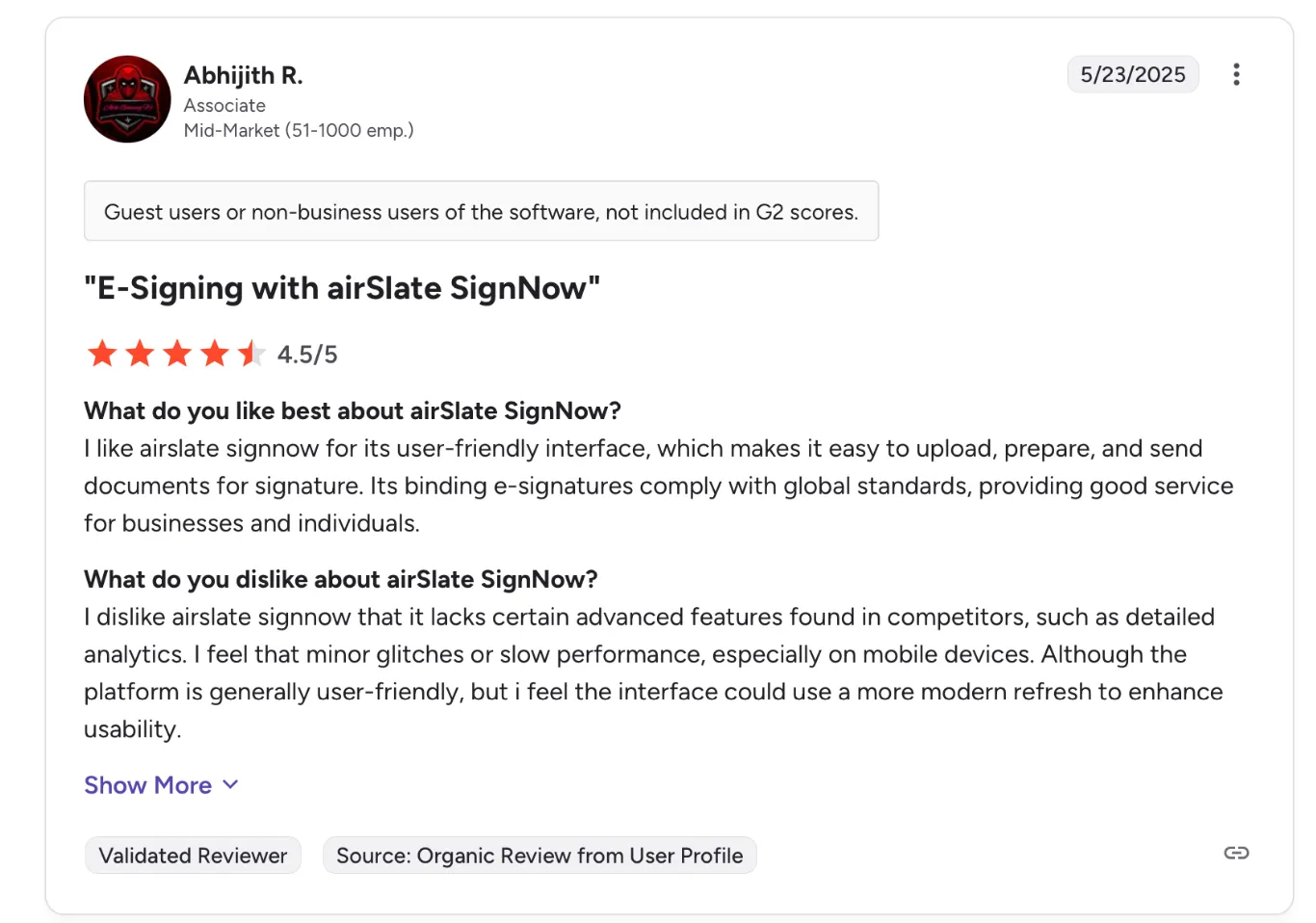
Users highlight SignNow’s simplicity for e-signatures
What makes airSlate SignNow stand out:
SignNow combines affordability with enterprise-grade functionality like kiosk signing, payment collection, and offline signing. Its straightforward pricing and intuitive interface make it a top pick for small and mid-sized businesses.
Support options:
Email, live chat, help center
G2 rating:
How to choose the best Contract Management Software for your business
Selecting the right platform means matching its capabilities to your contract types, compliance requirements, and growth plans. Whether you manage large procurement volumes, complex vendor agreements, or regulated documents such as HIPAA-compliant forms, these steps will guide your decision.
- Contact your legal team
Engage legal stakeholders from the start. They can flag critical compliance and security needs — such as encryption standards, role-based permissions, redlining protocols, and approval workflows — that directly impact risk management.
- Define your needs
Identify who will use the platform and for what purpose. Procurement may need clause libraries for supplier contracts, sales teams may prioritize CRM integrations, and HR could require quick-turn templates for NDAs and offer letters. Quantifying contract volume, renewal frequency, and current bottlenecks will help separate must-have features from optional extras.
- Research and compare options
Explore independent review sites like G2 and Capterra to understand how each platform performs in real-world scenarios. Compare usability, support responsiveness, integration depth, and customer ratings across companies similar to yours.
- Prioritize essential features
Core capabilities — including eSignatures, searchable repositories, workflow automation, contract templates, and robust audit trails — form the foundation of efficient contract management. For scaling teams, look for advanced collaboration tools such as real-time editing, version control, and multi-signer routing.
- Evaluate cost and implementation
Assess not only subscription fees but also onboarding, training, customization, and integration costs. Understand the implementation timeline and whether internal resources can handle the rollout.
Try the Signeasy ROI calculator and find realistic estimates of the time and money you will save with Signeasy!
- Test and choose the best
Most platforms offer free trials or demos to simulate actual use cases — send an NDA for signature, run an approval workflow for a vendor agreement, or integrate with tools like Salesforce or Google Workspace. Involve end users from each department to gather feedback on usability, performance, and fit.
To see how this works in practice, explore Signeasy’s interactive demo and experience a complete contract management workflow from start to finish.

Balancing cost and capability: Signeasy’s advantage
Signeasy stands out as a reliable, flexible, and user-friendly contract management solution, especially for businesses that want speed without complexity. Here’s what makes it a strong pick:

- Scalable: Designed to grow with your team, whether you’re onboarding five users or fifty.
- Security and compliance: Meets global standards like HIPAA, SOC 2, and eIDAS to keep your documents secure and legally compliant.
- AI insights: Use intelligent features such as AI summary, smart Q&A, and contract renewal reminder that help track performance, identify bottlenecks, and streamline decisions.
- Strong integrations: Works seamlessly with tools your team already uses, like Google Workspace, Microsoft 365, and HubSpot.
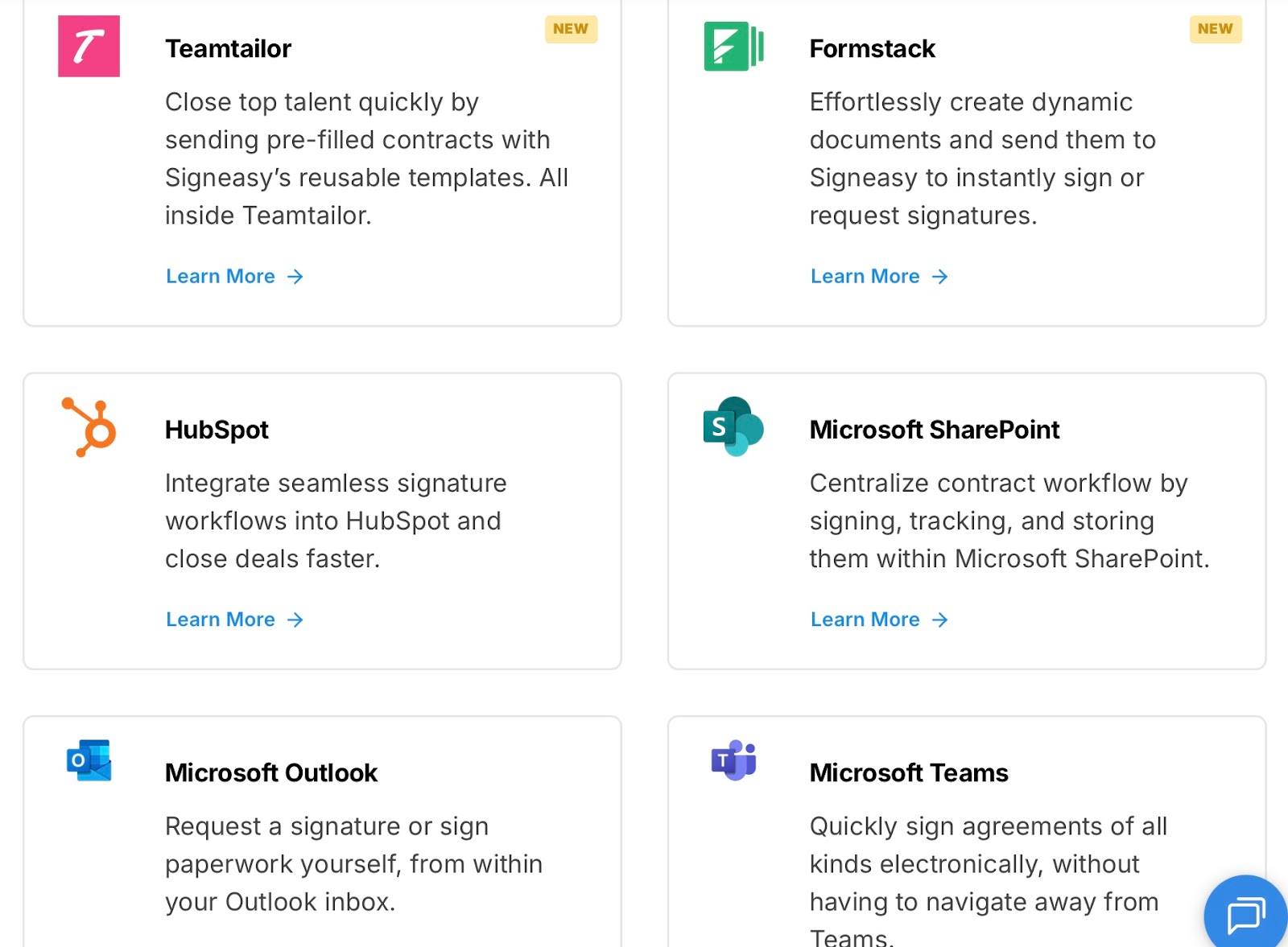
- Easy to set up: Get started in a few minutes with minimal IT involvement
- Cost-effective: Transparent pricing plans that suit small and mid-sized businesses without hidden fees
If you want a contract management tool that’s efficient, flexible, and built for modern teams, Signeasy is for you.
Book a demo now to see how it can simplify contract management for your team.




